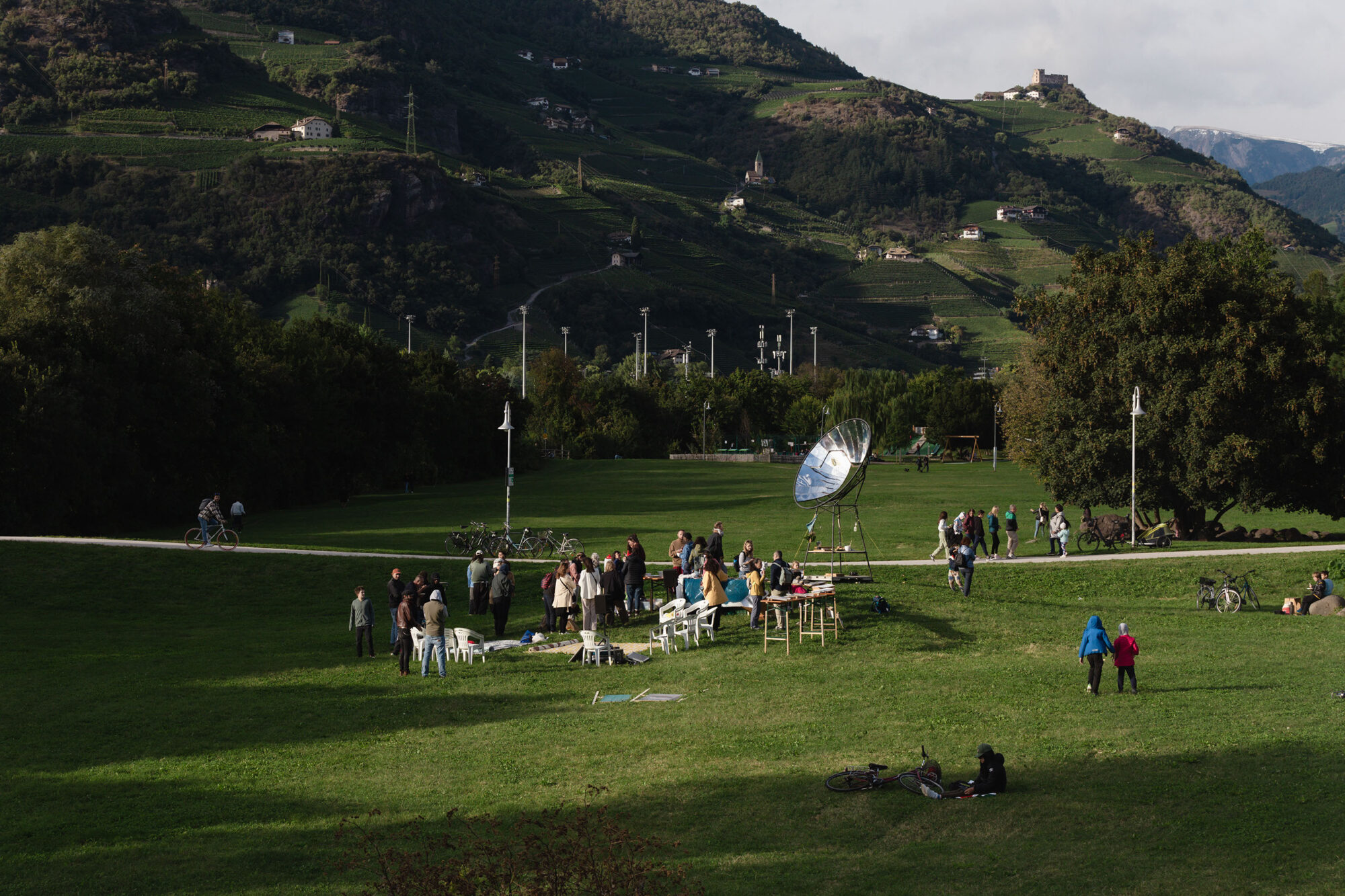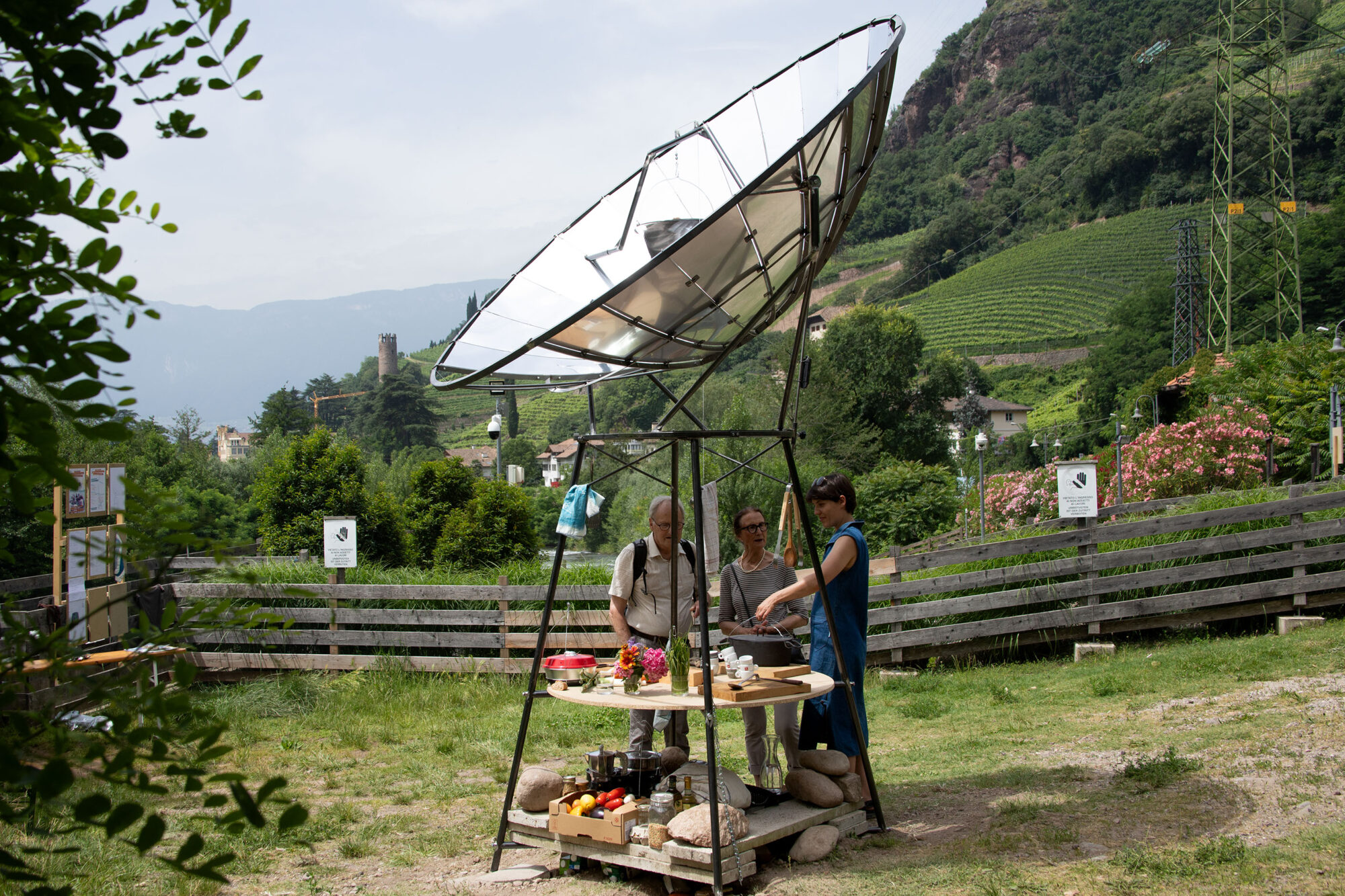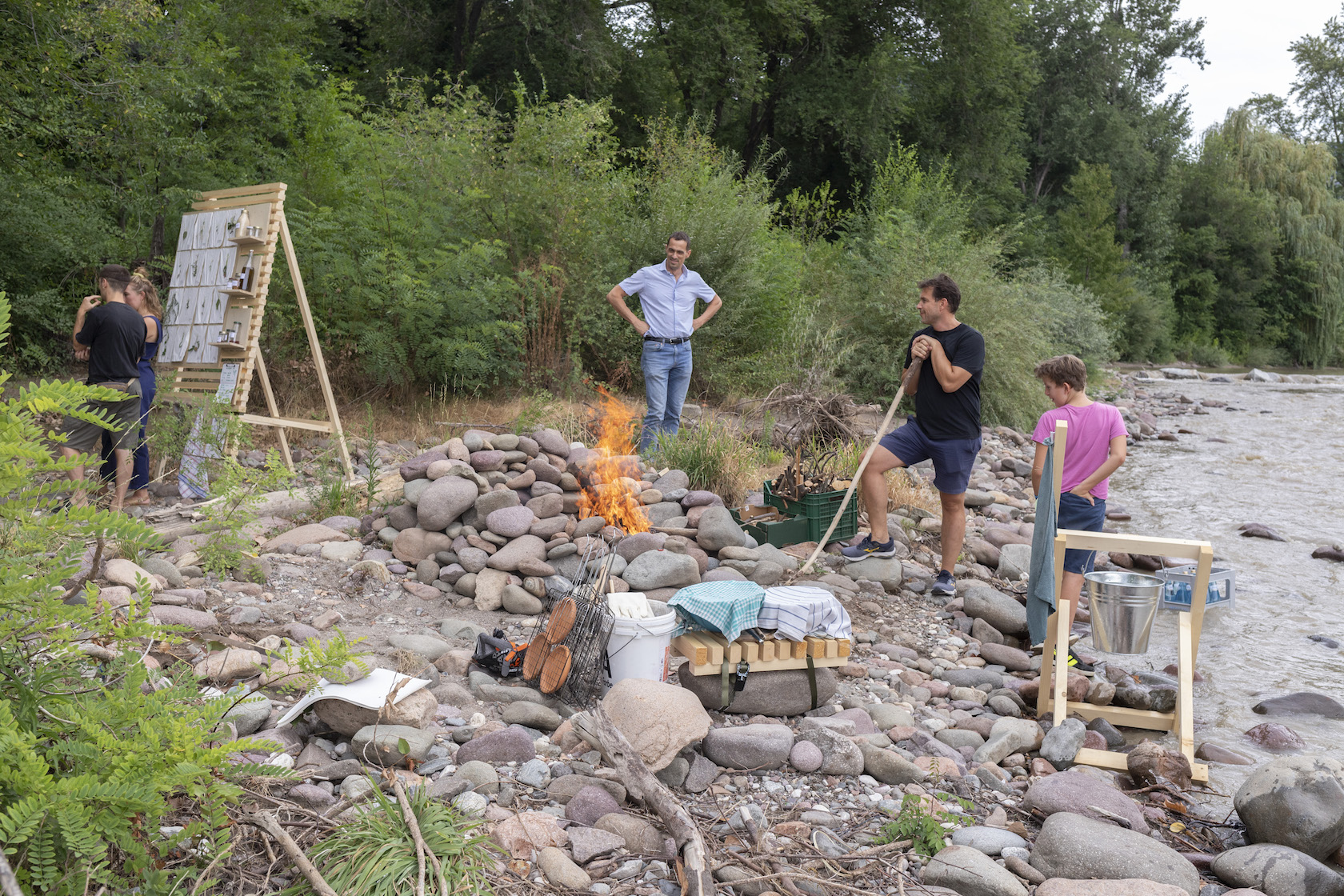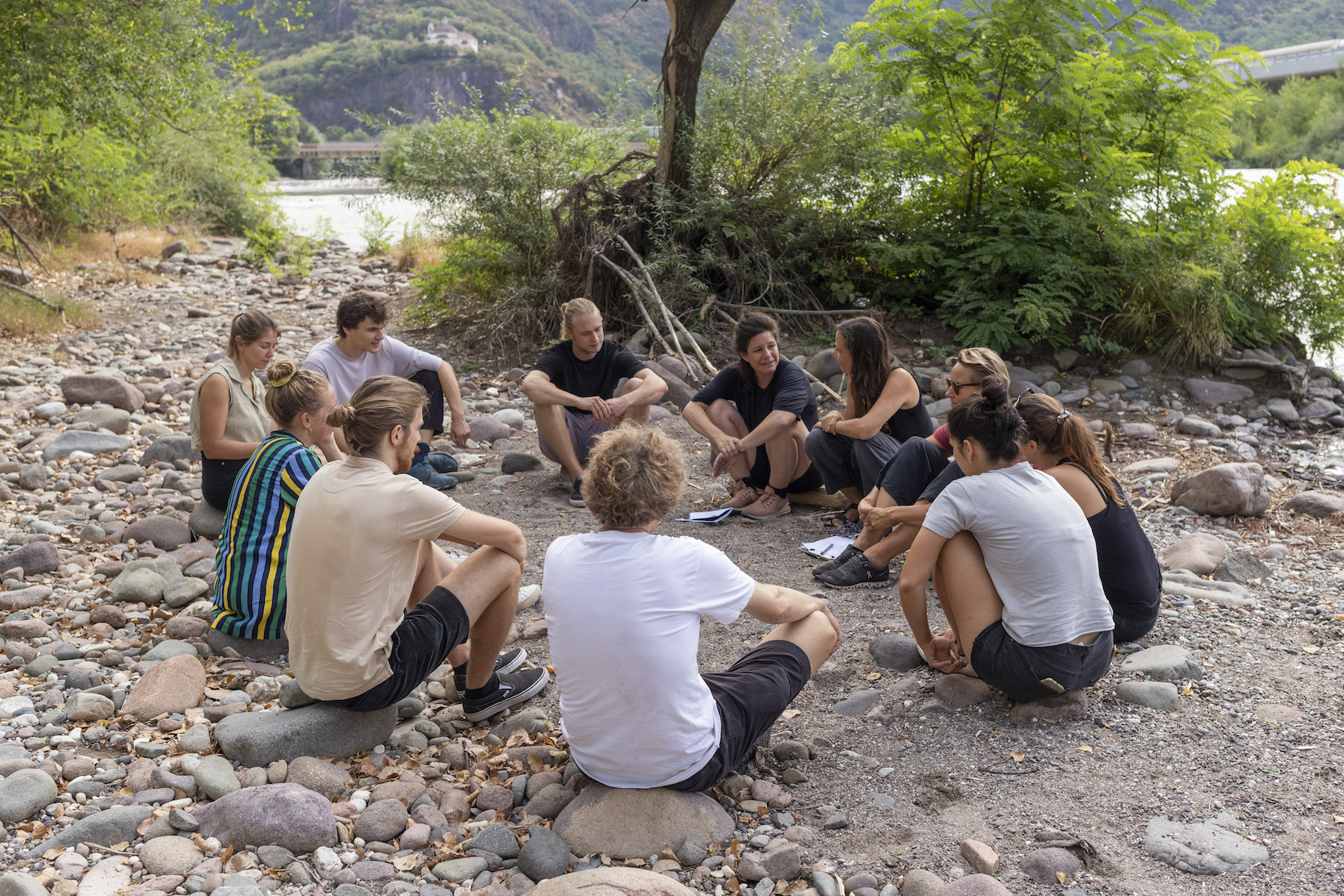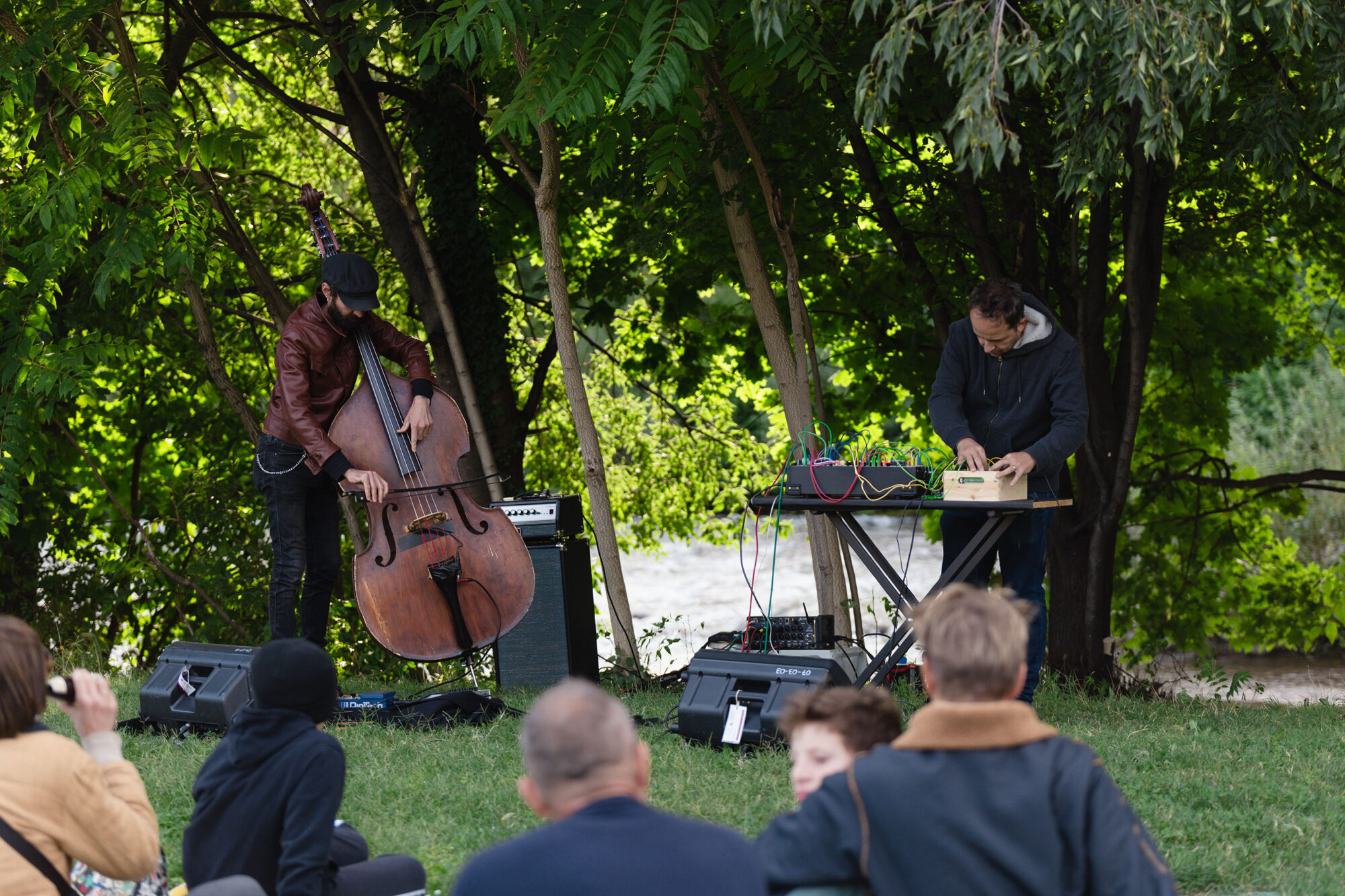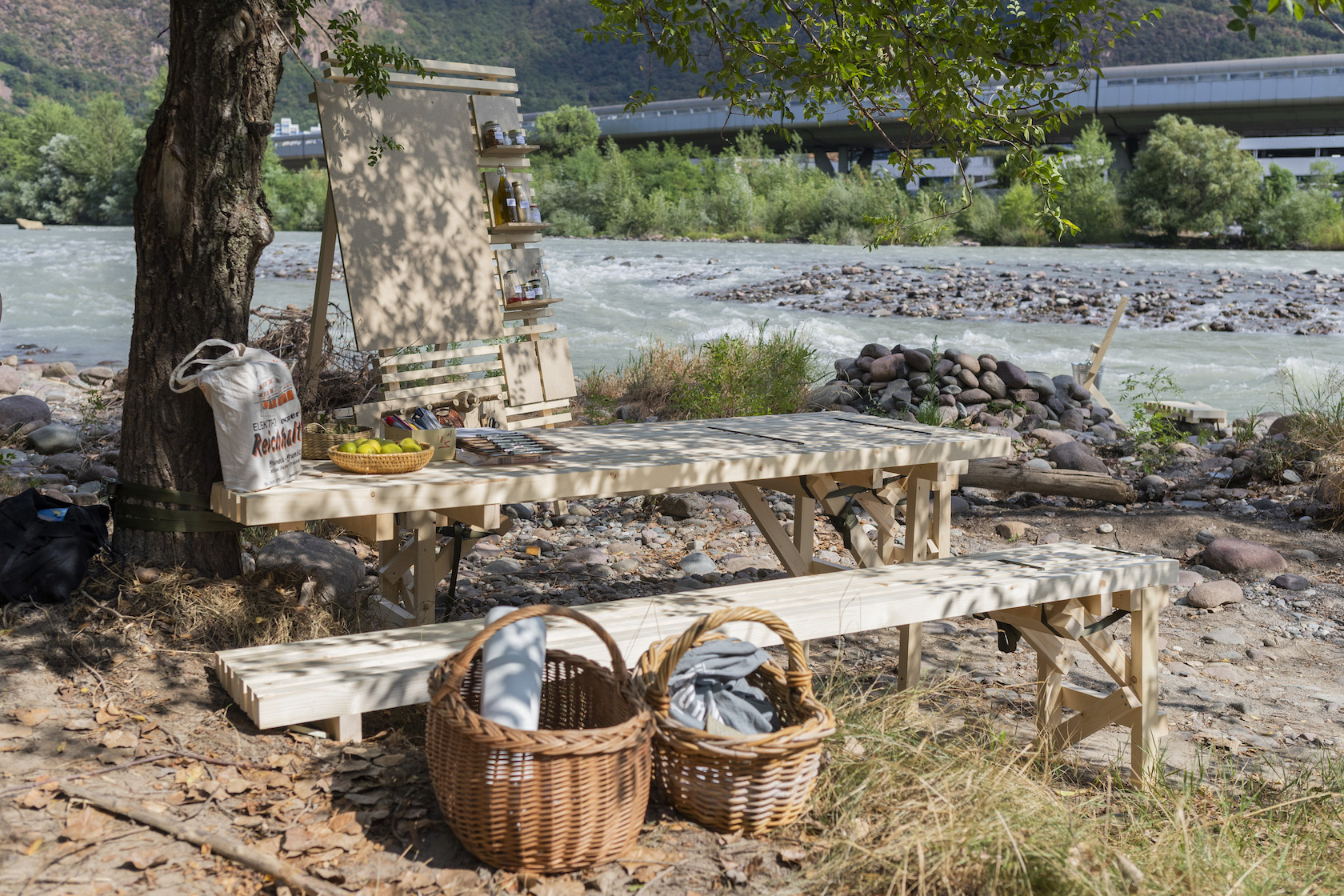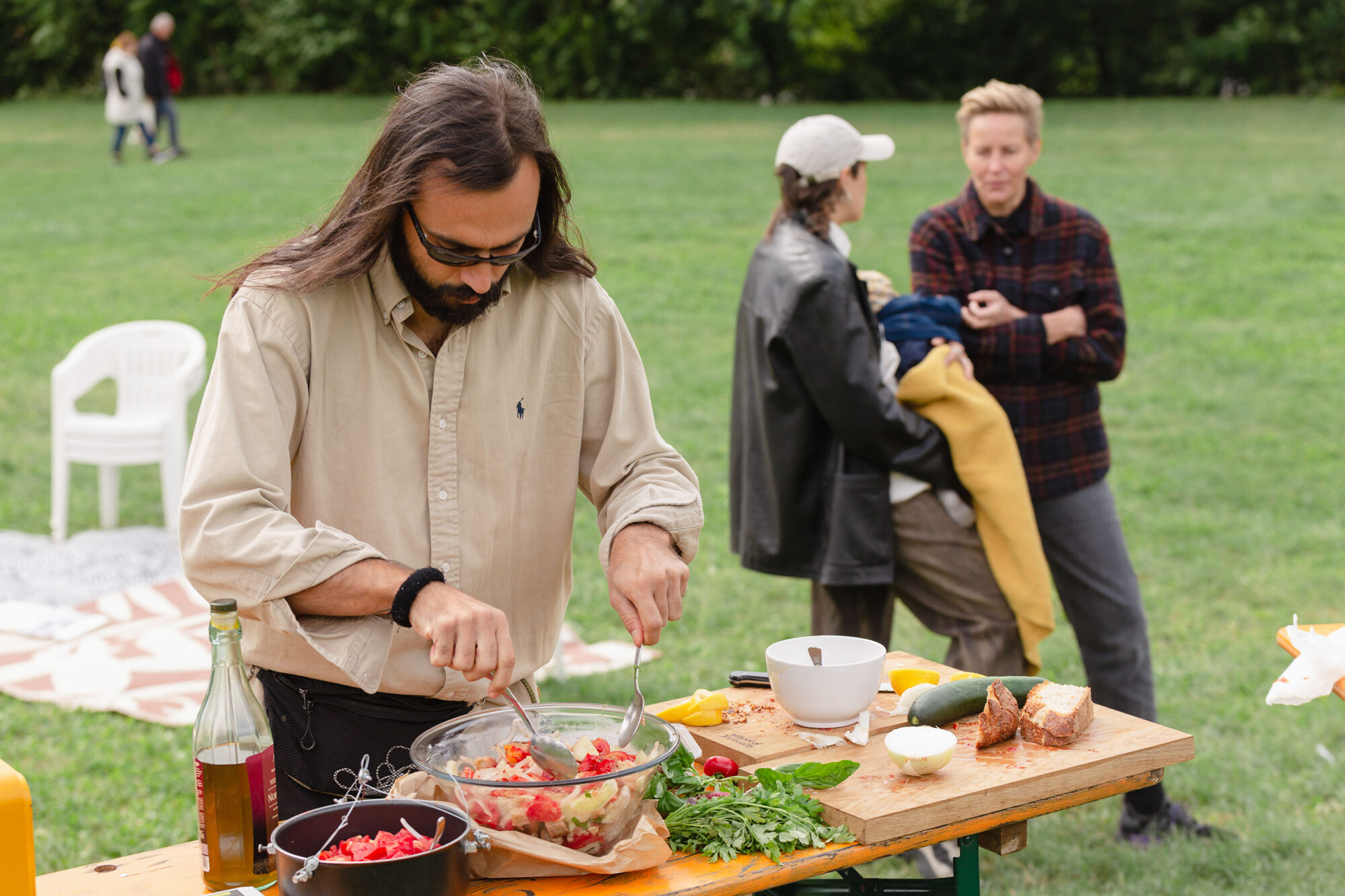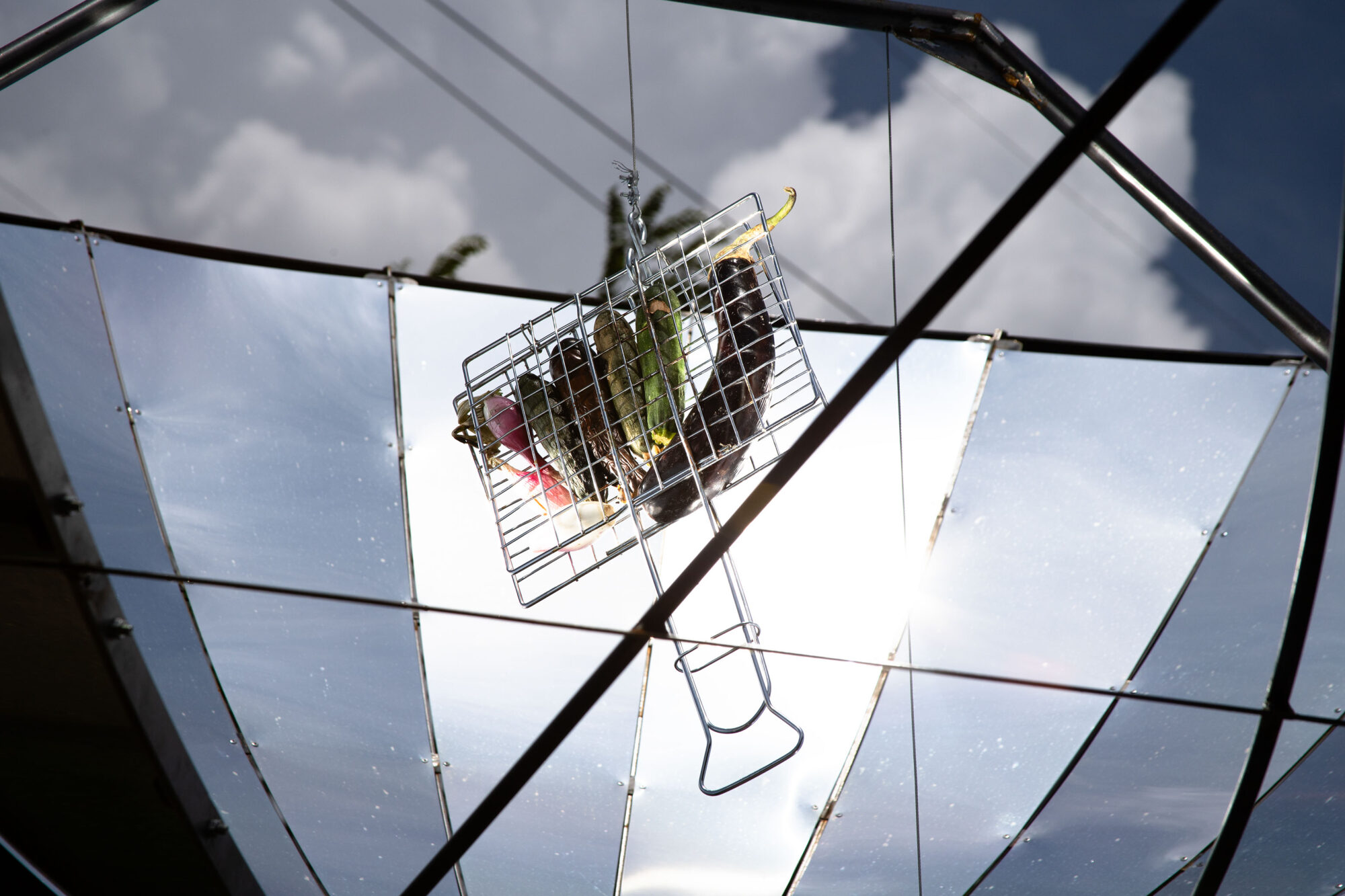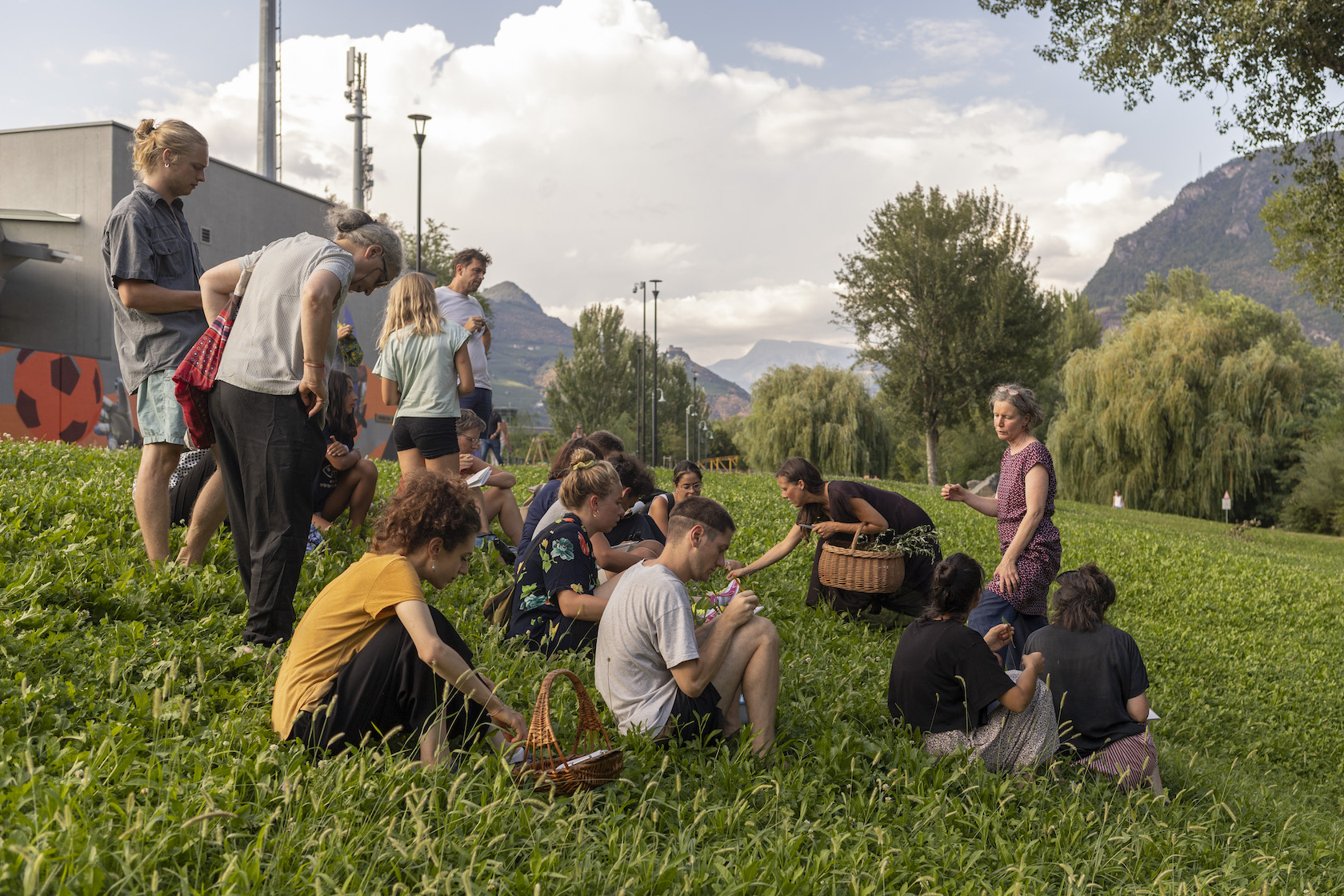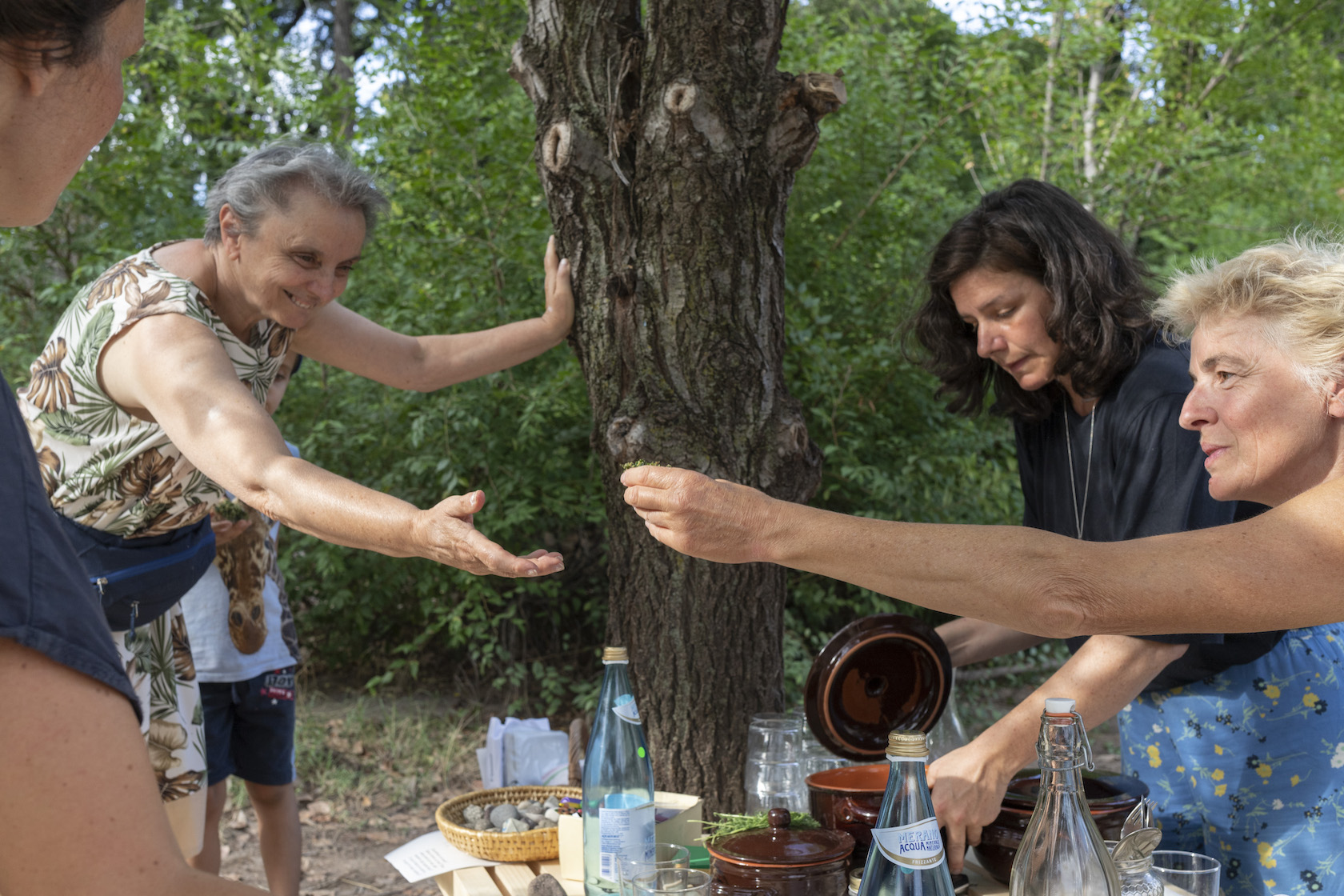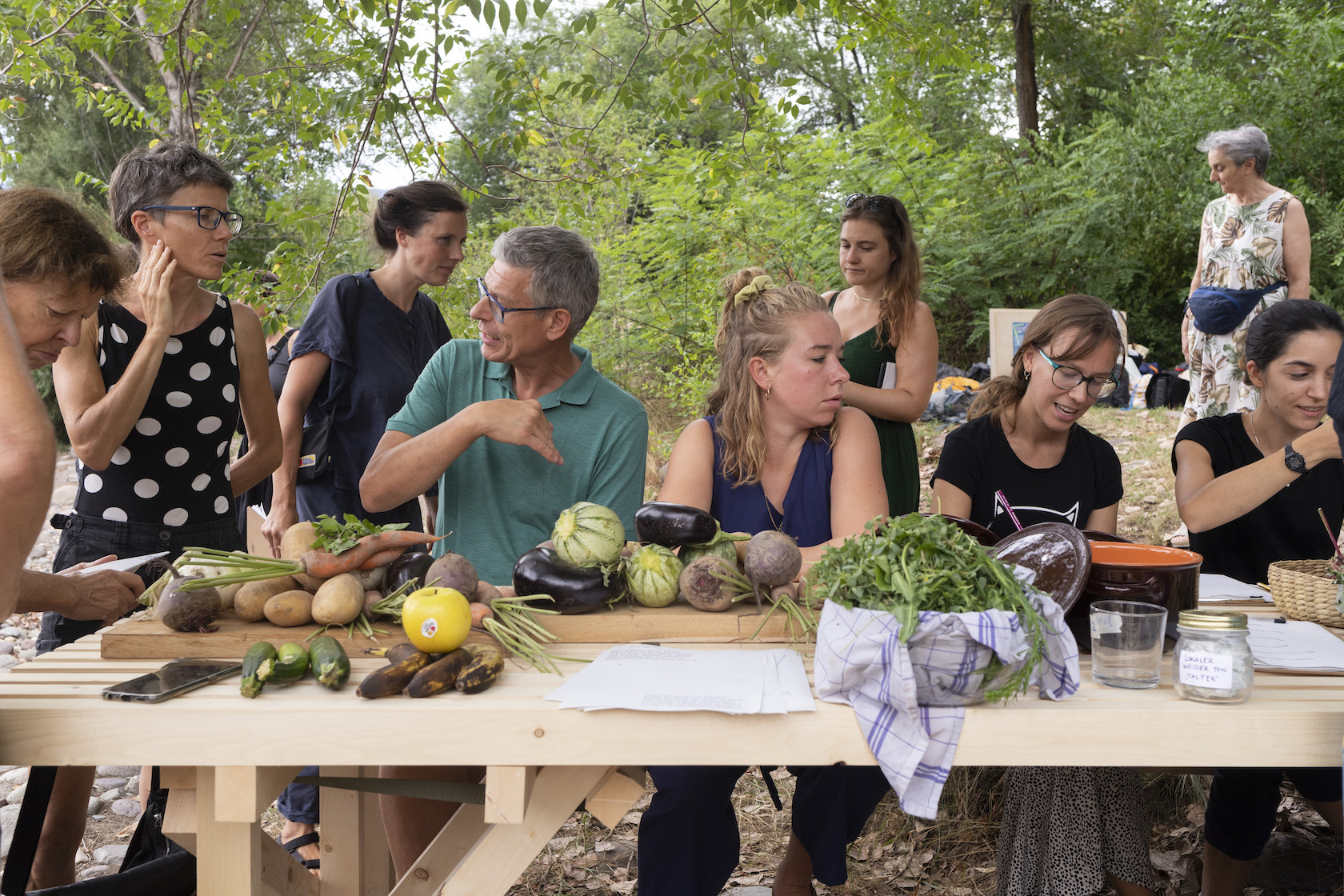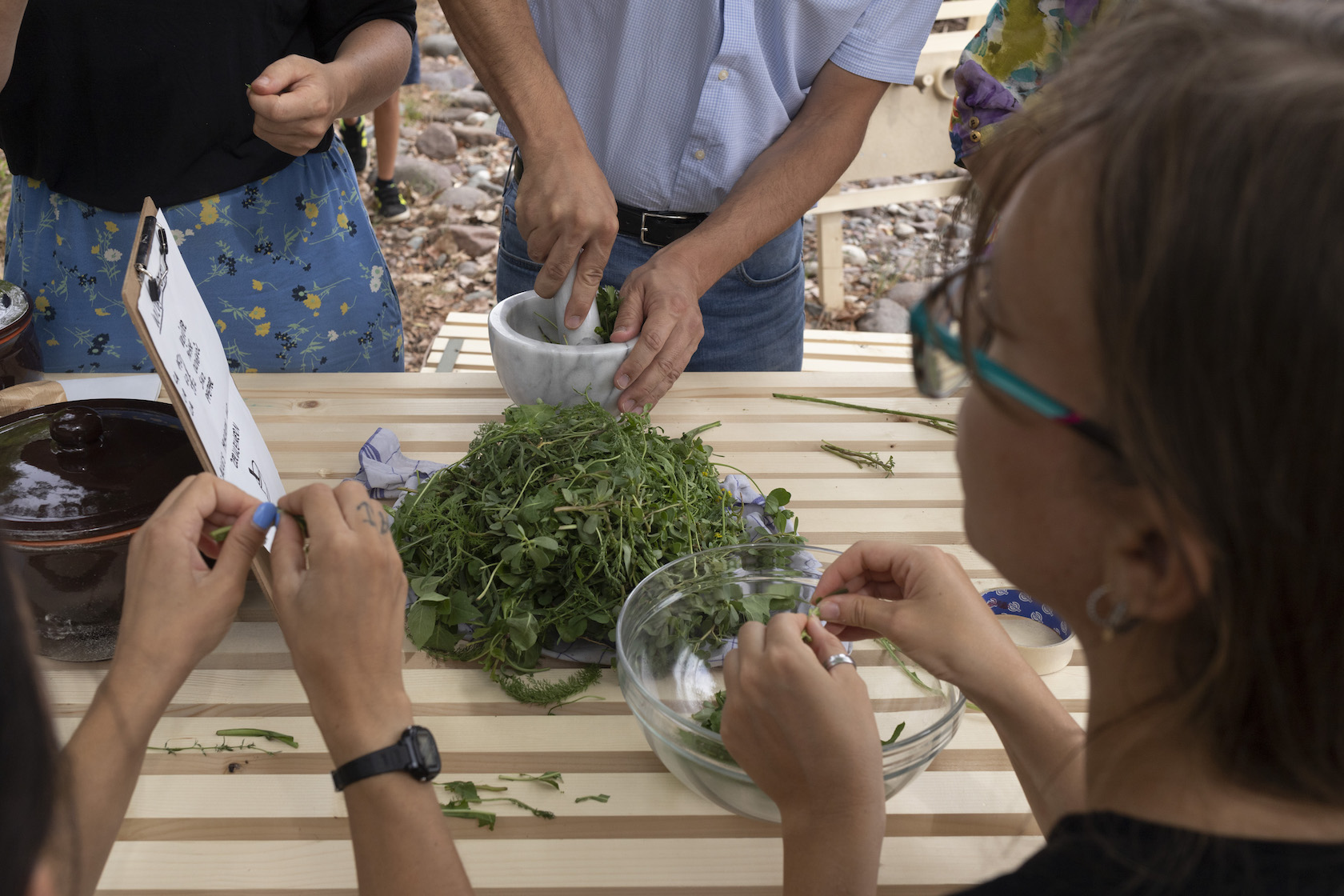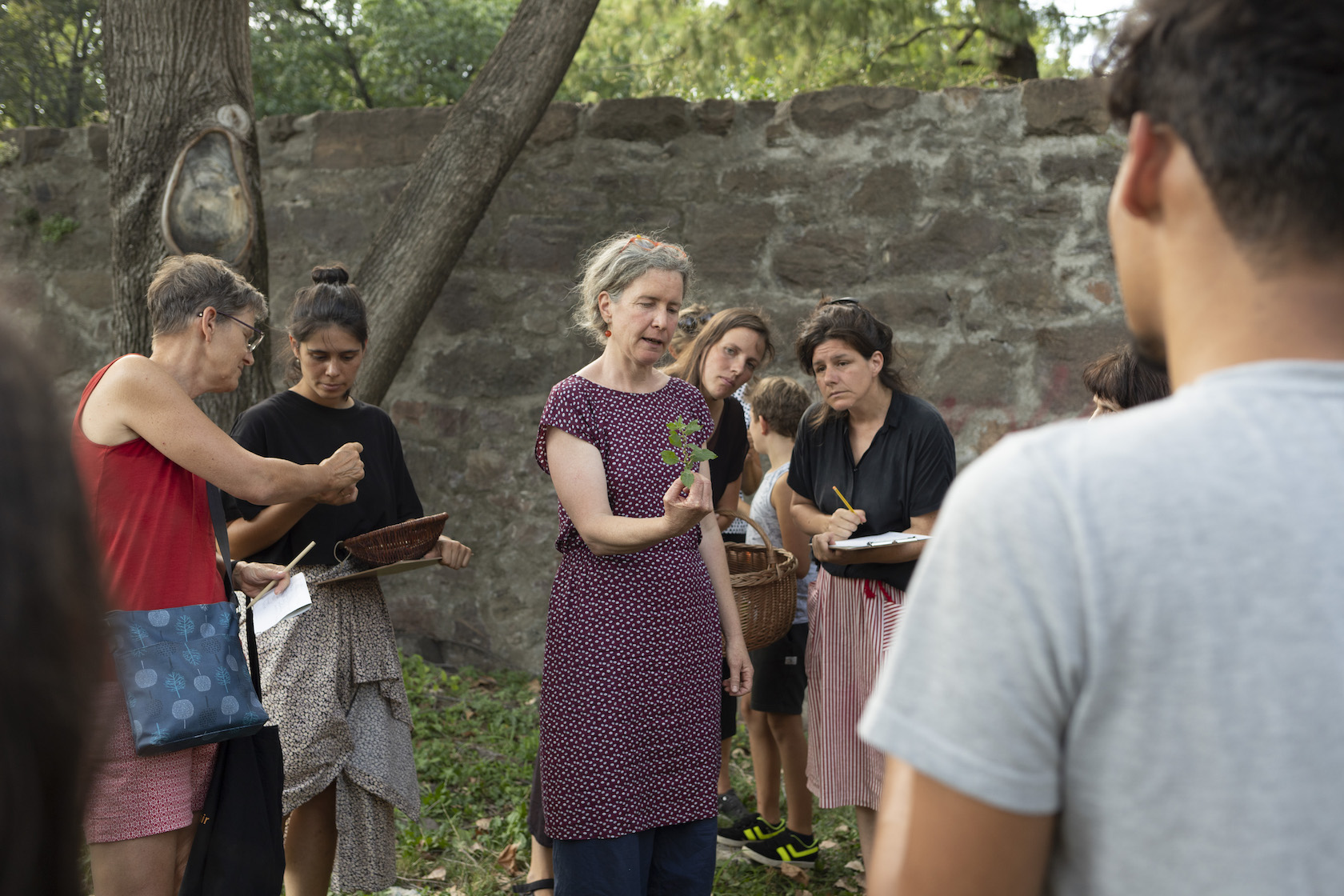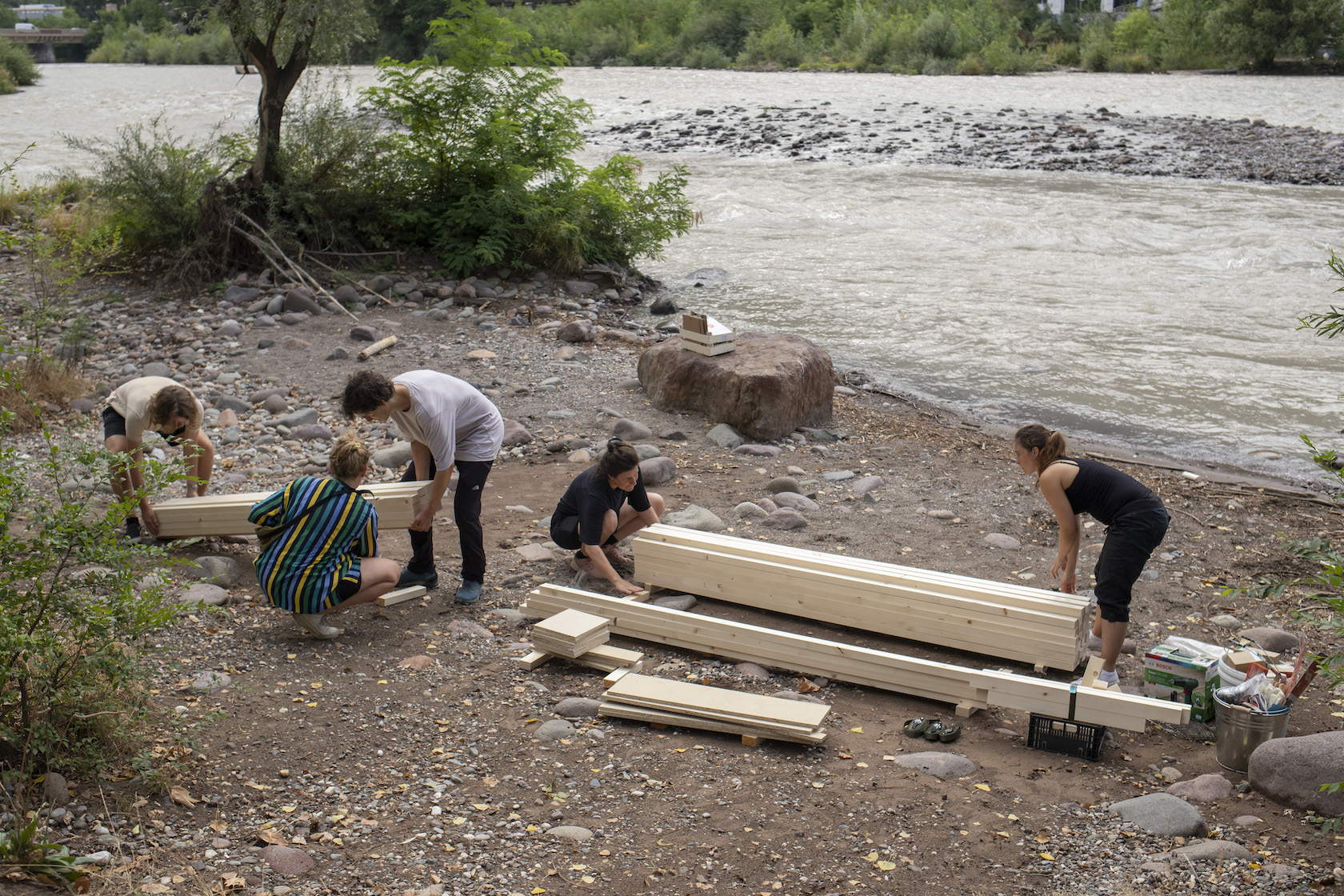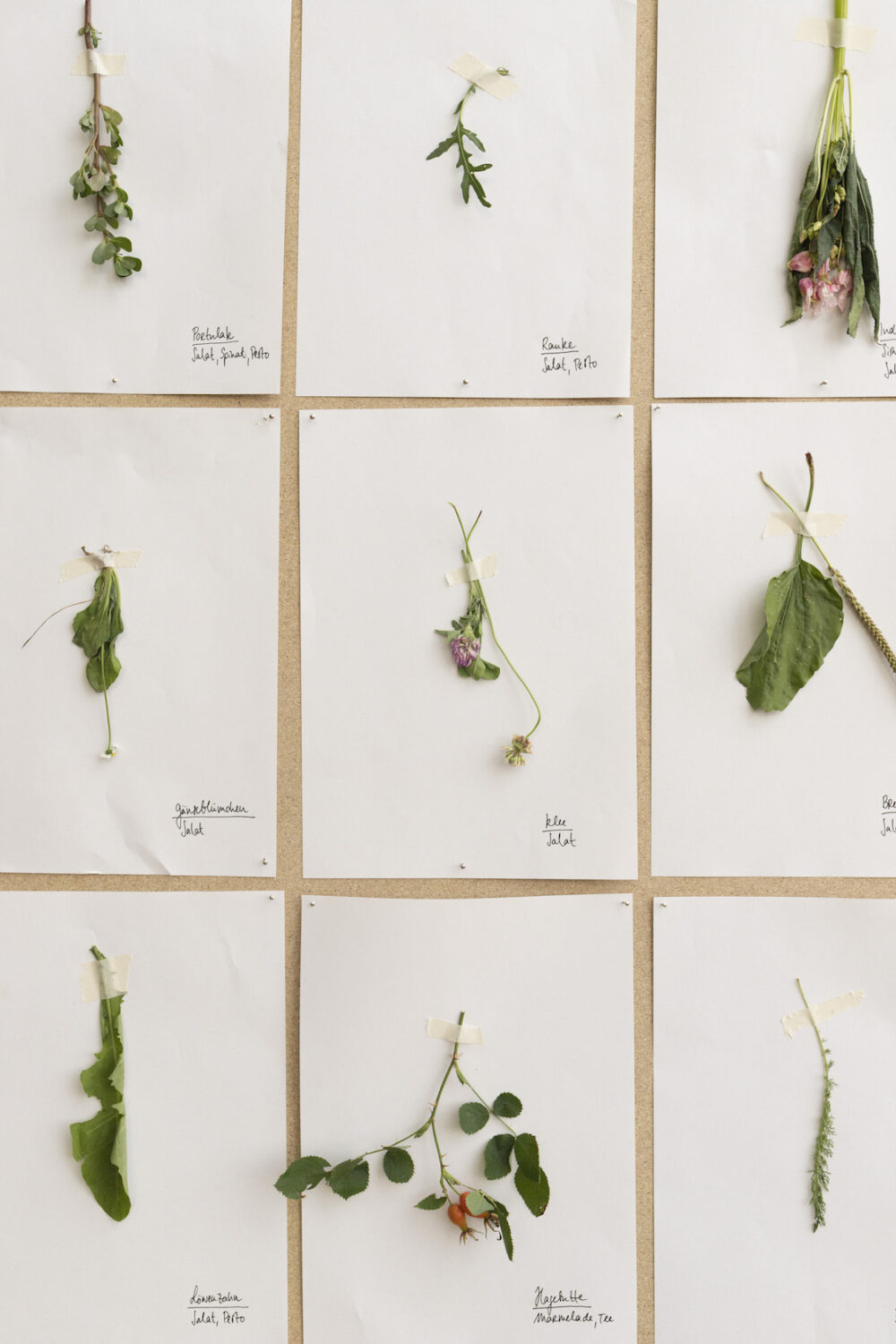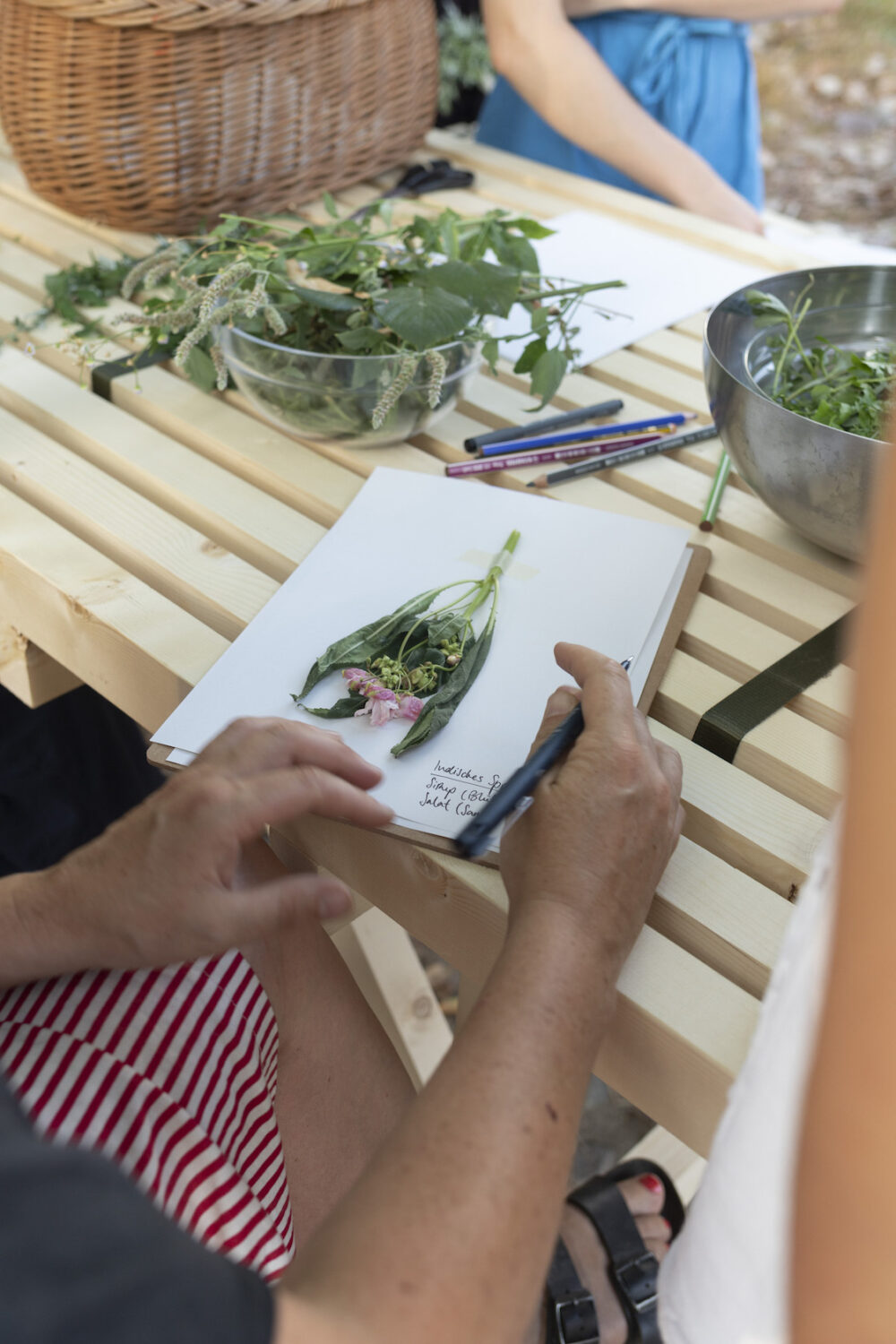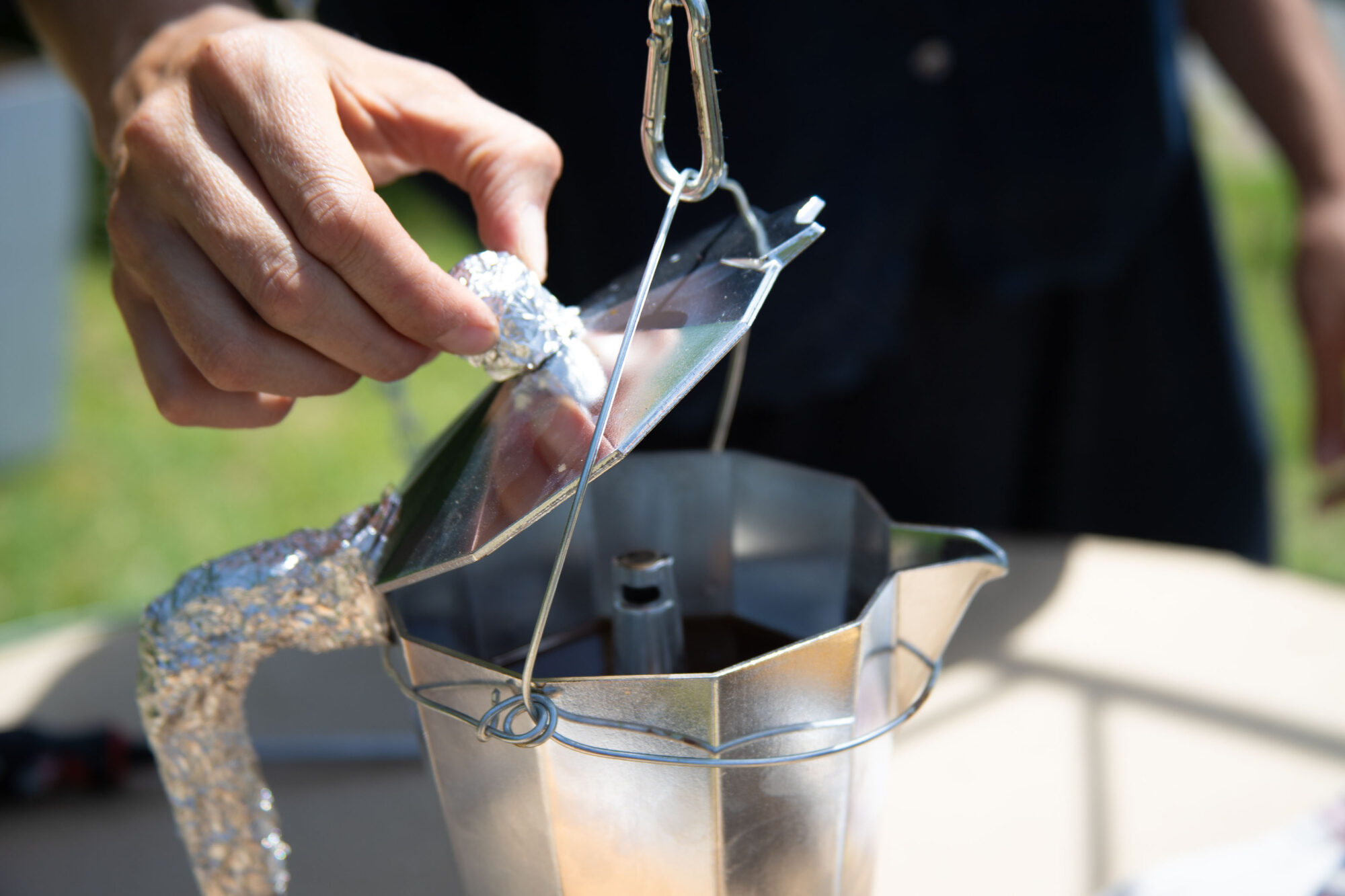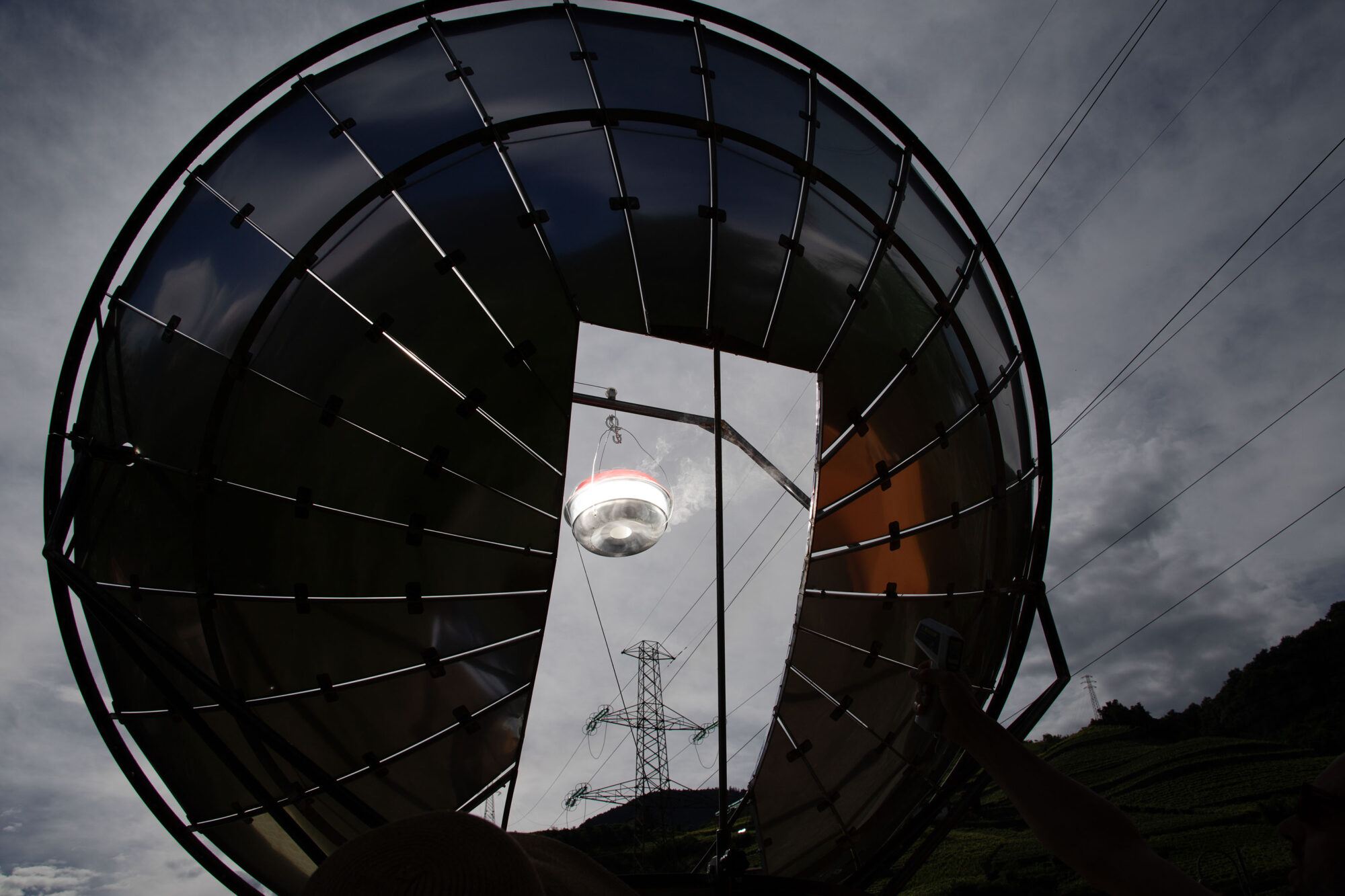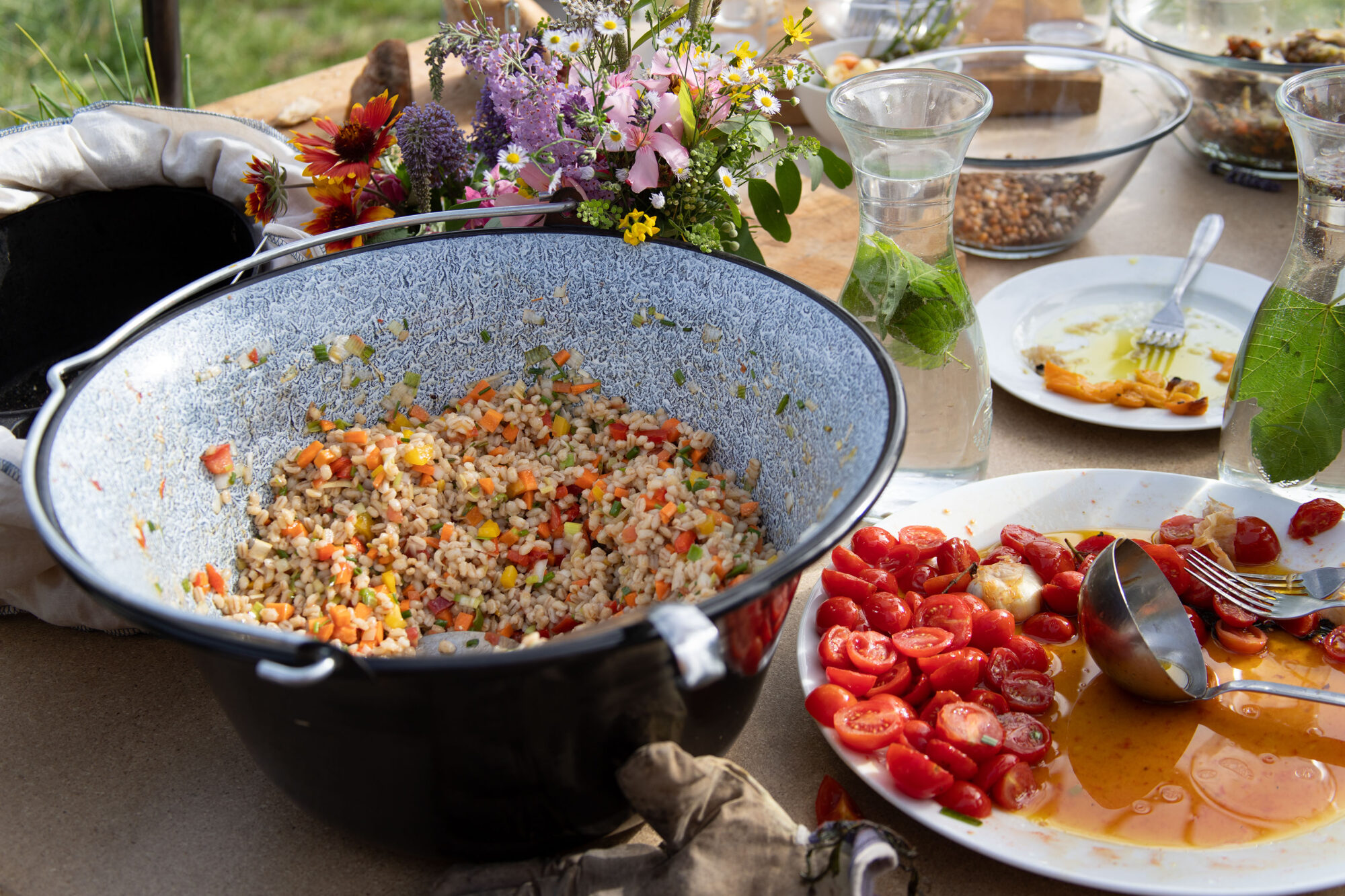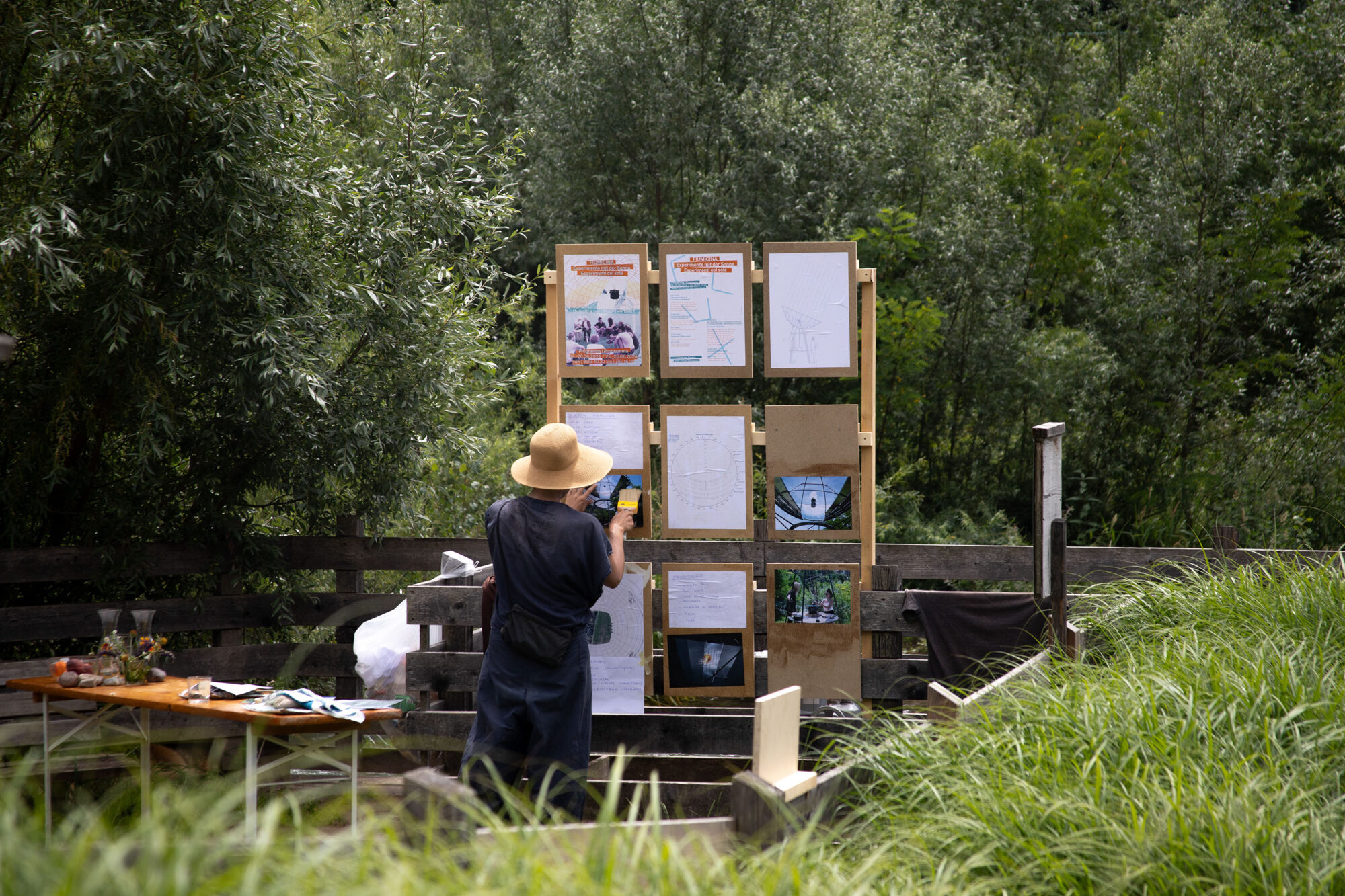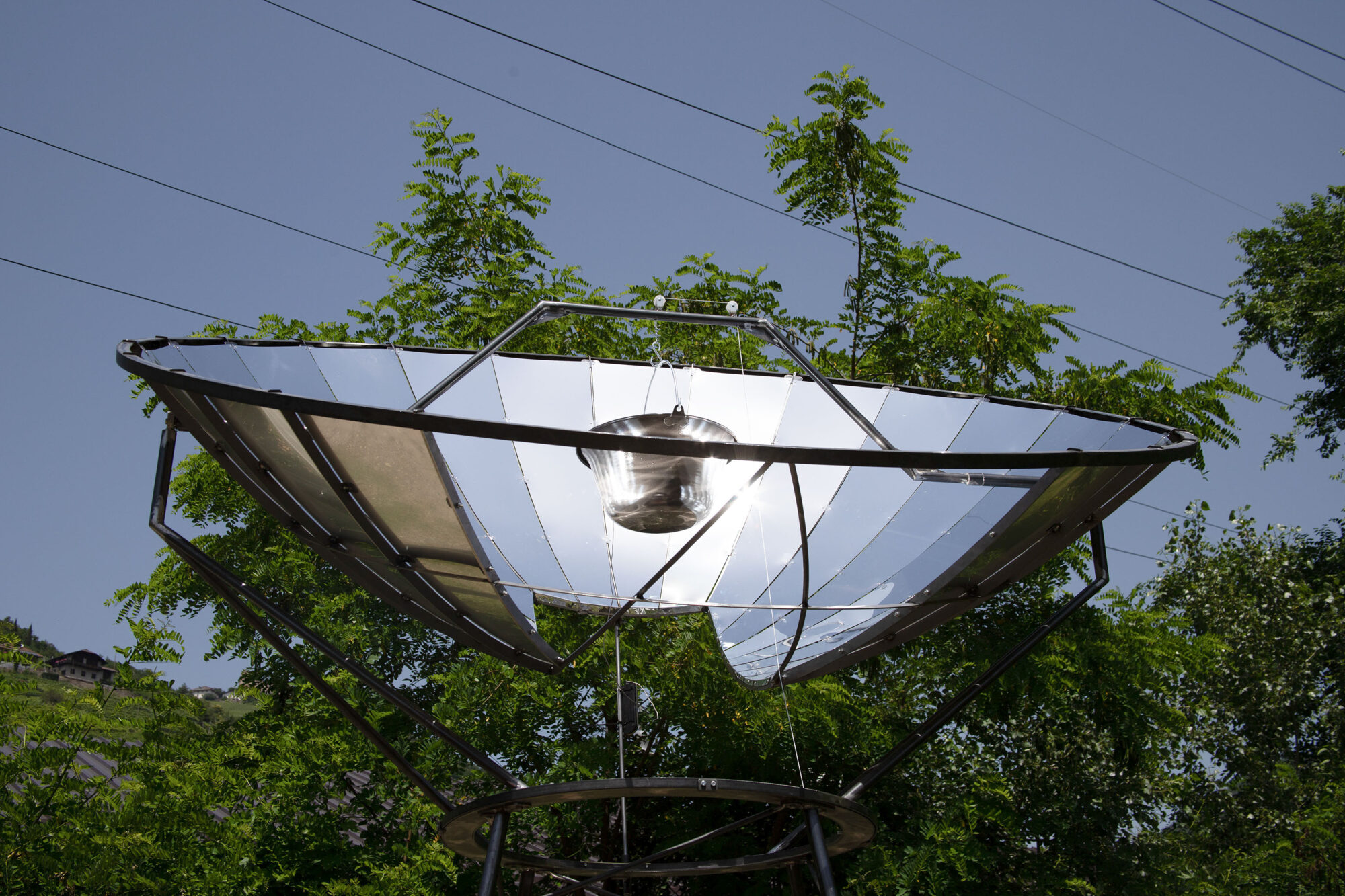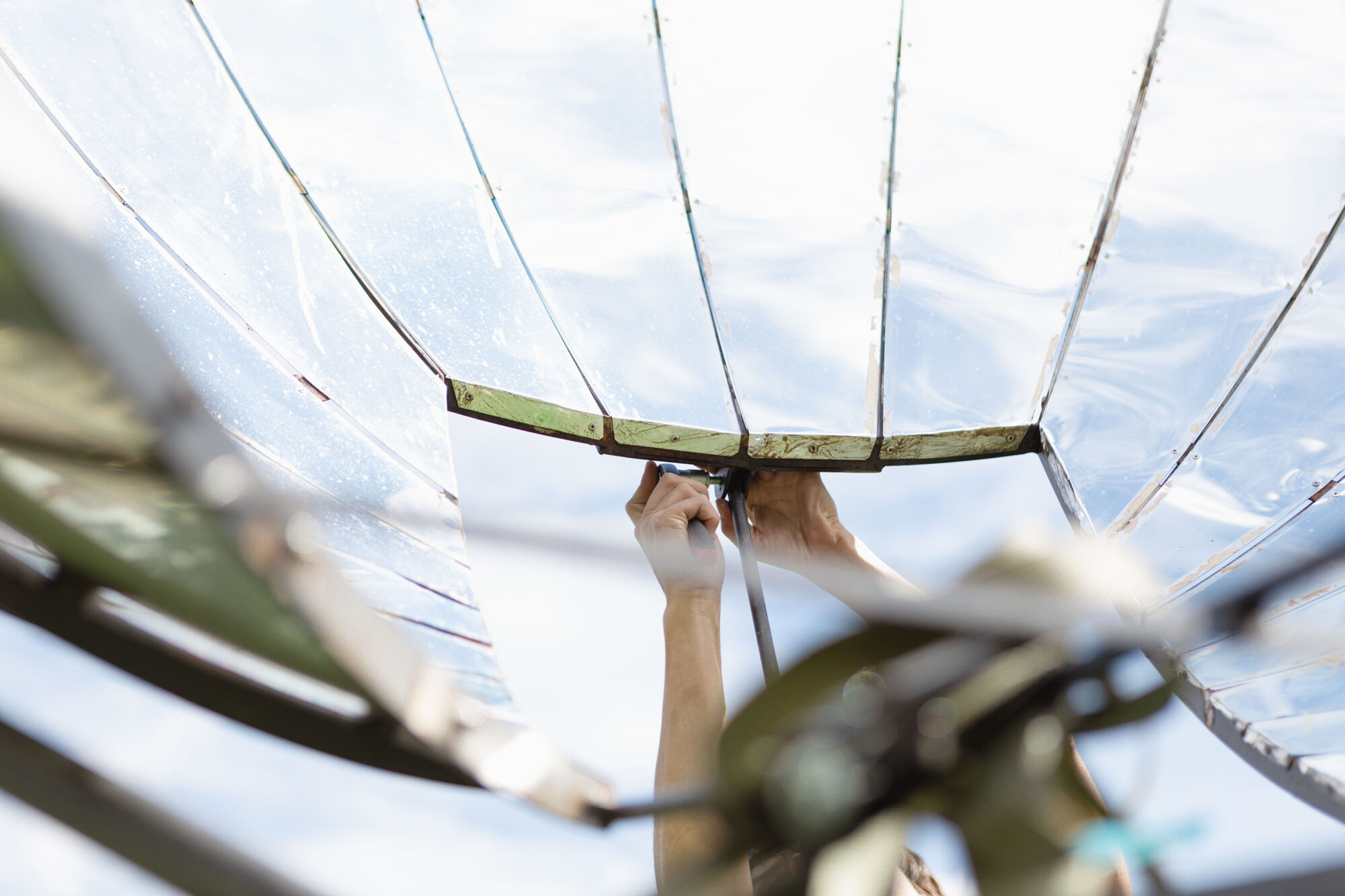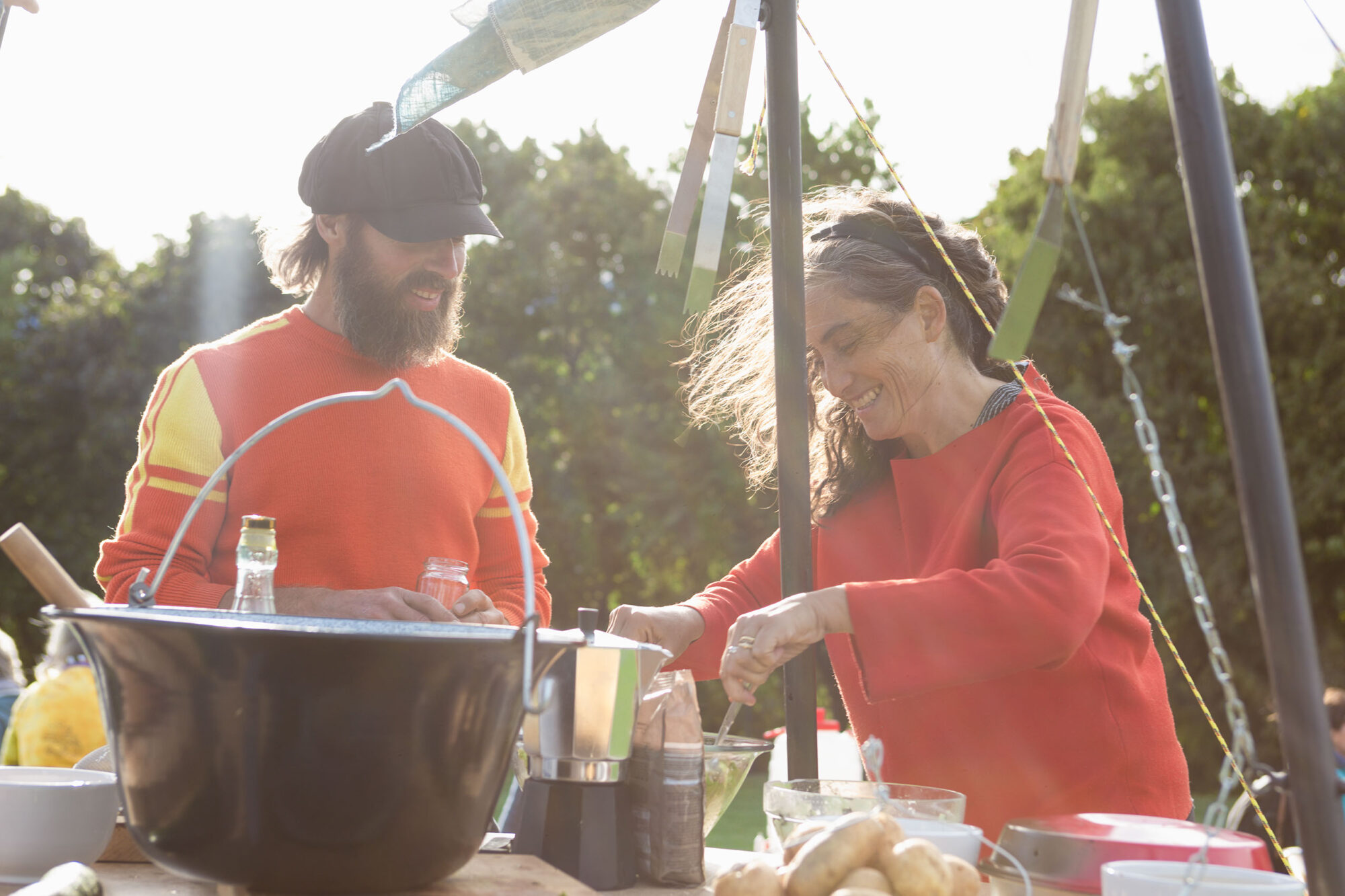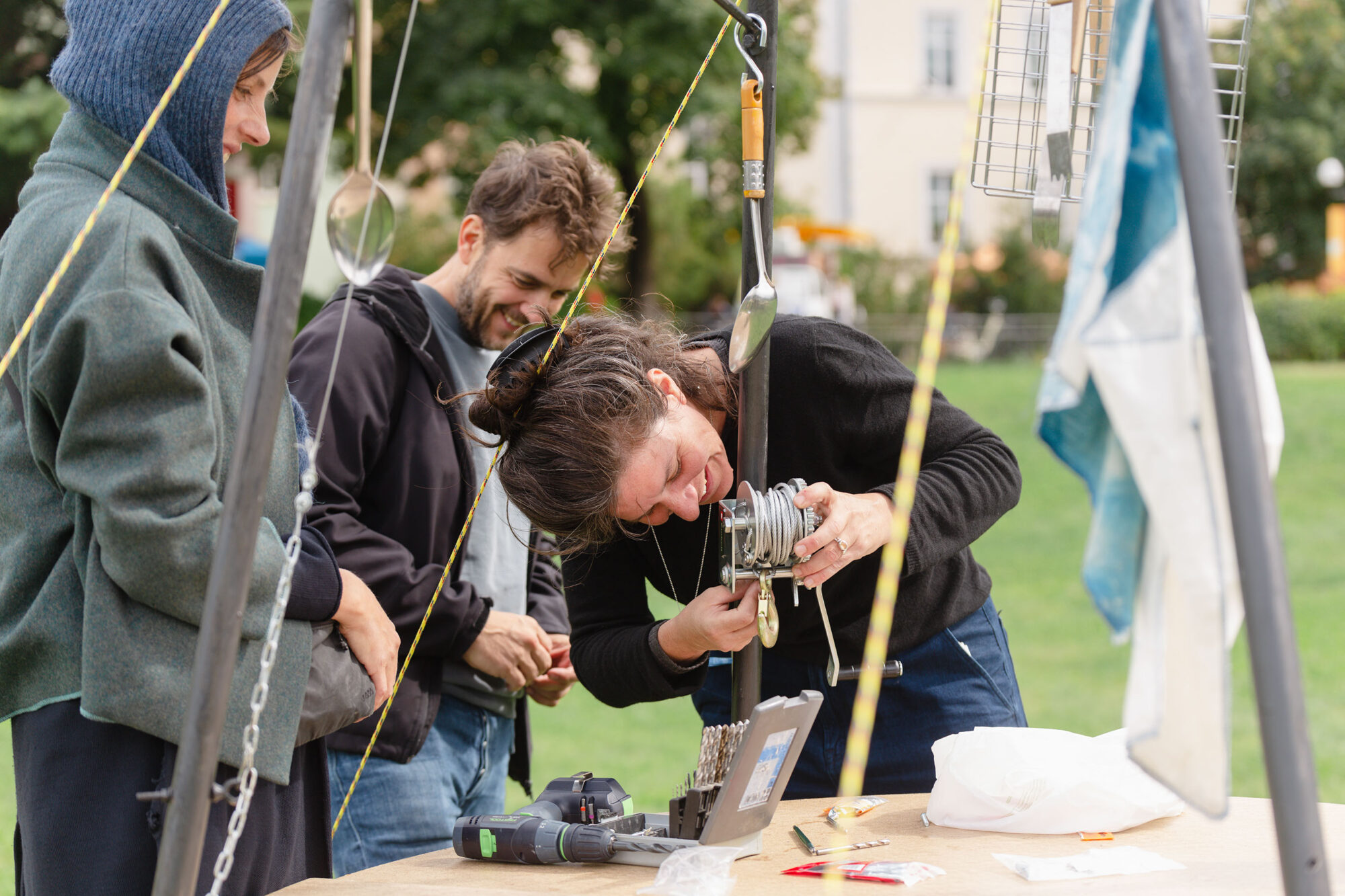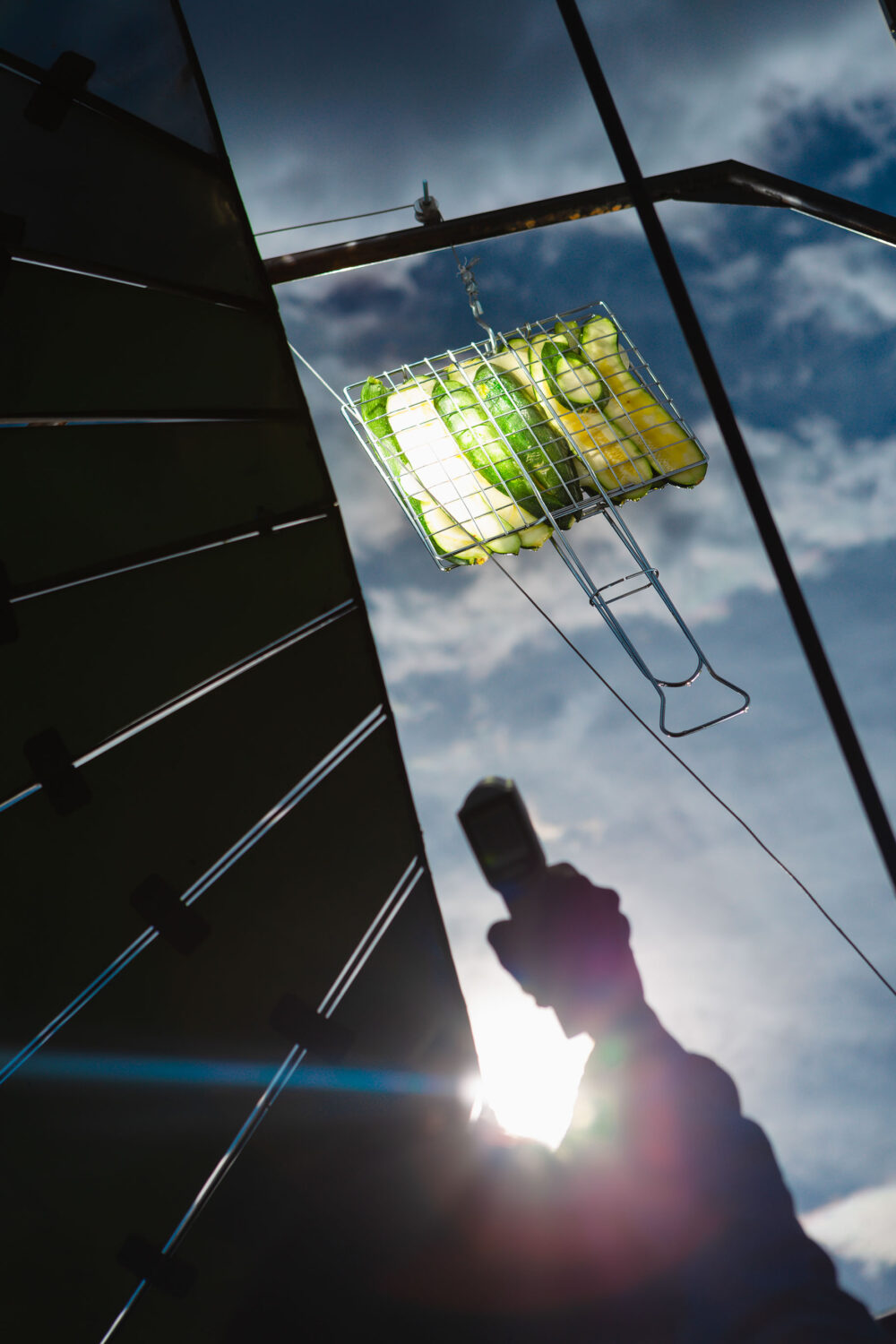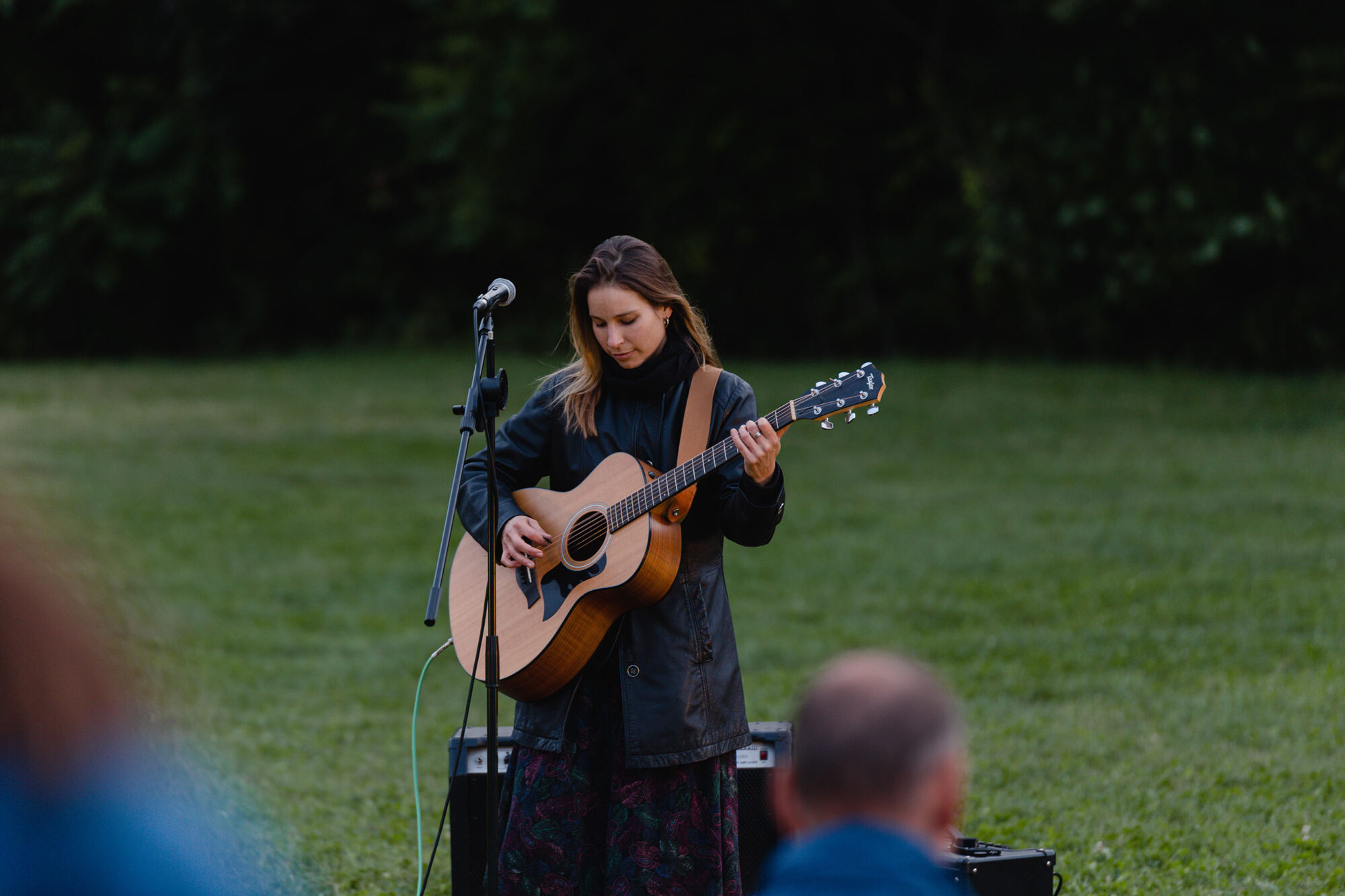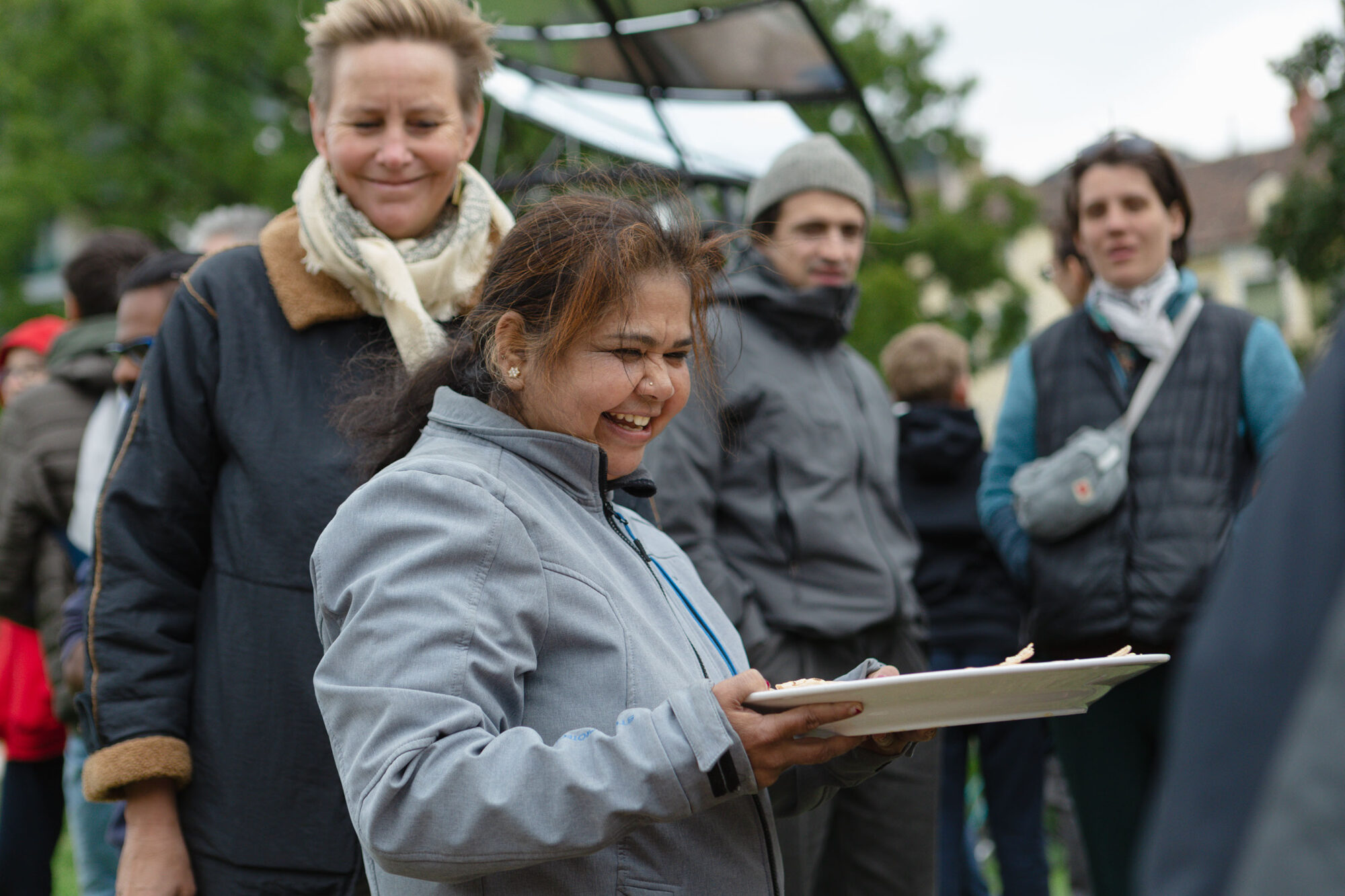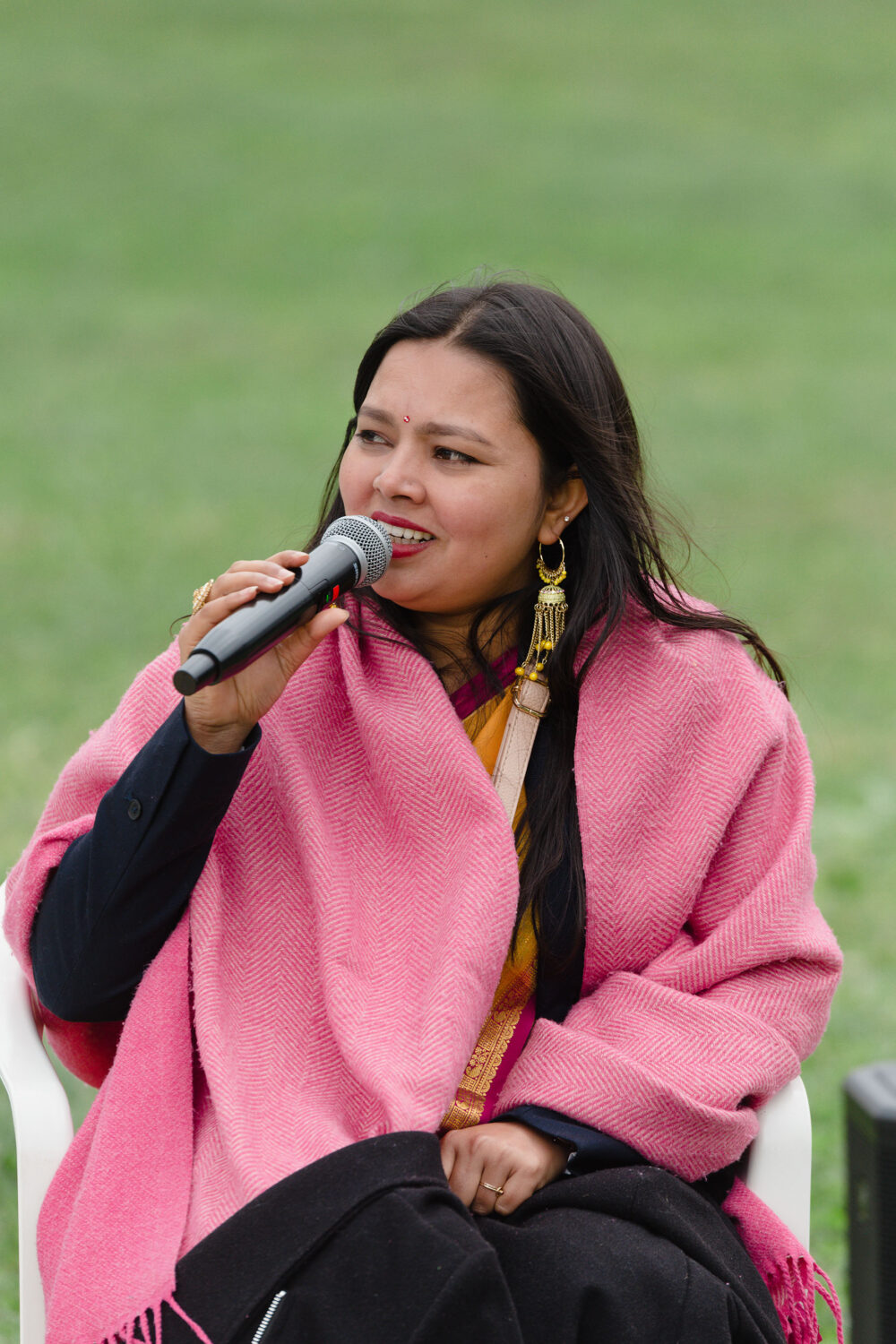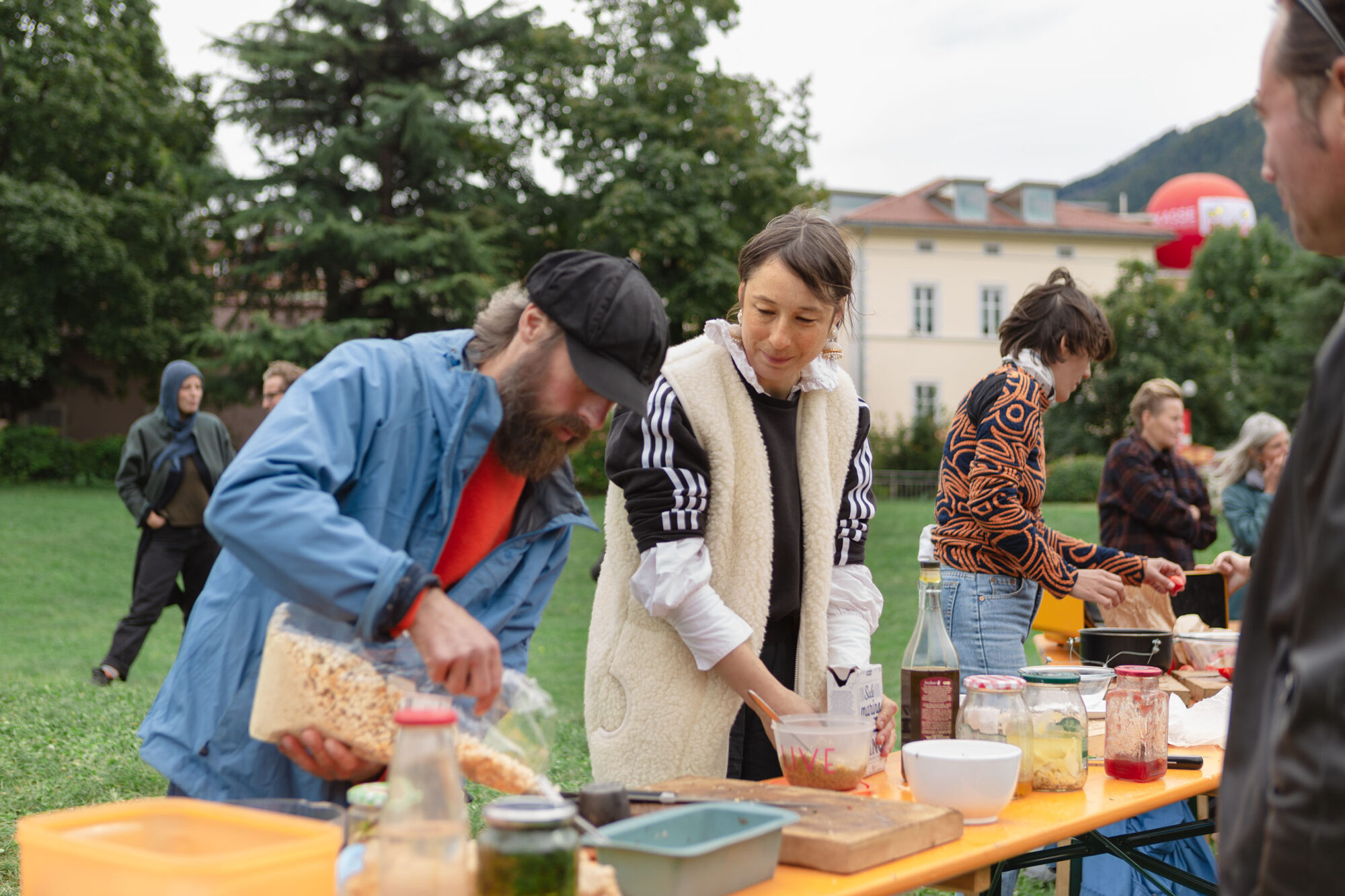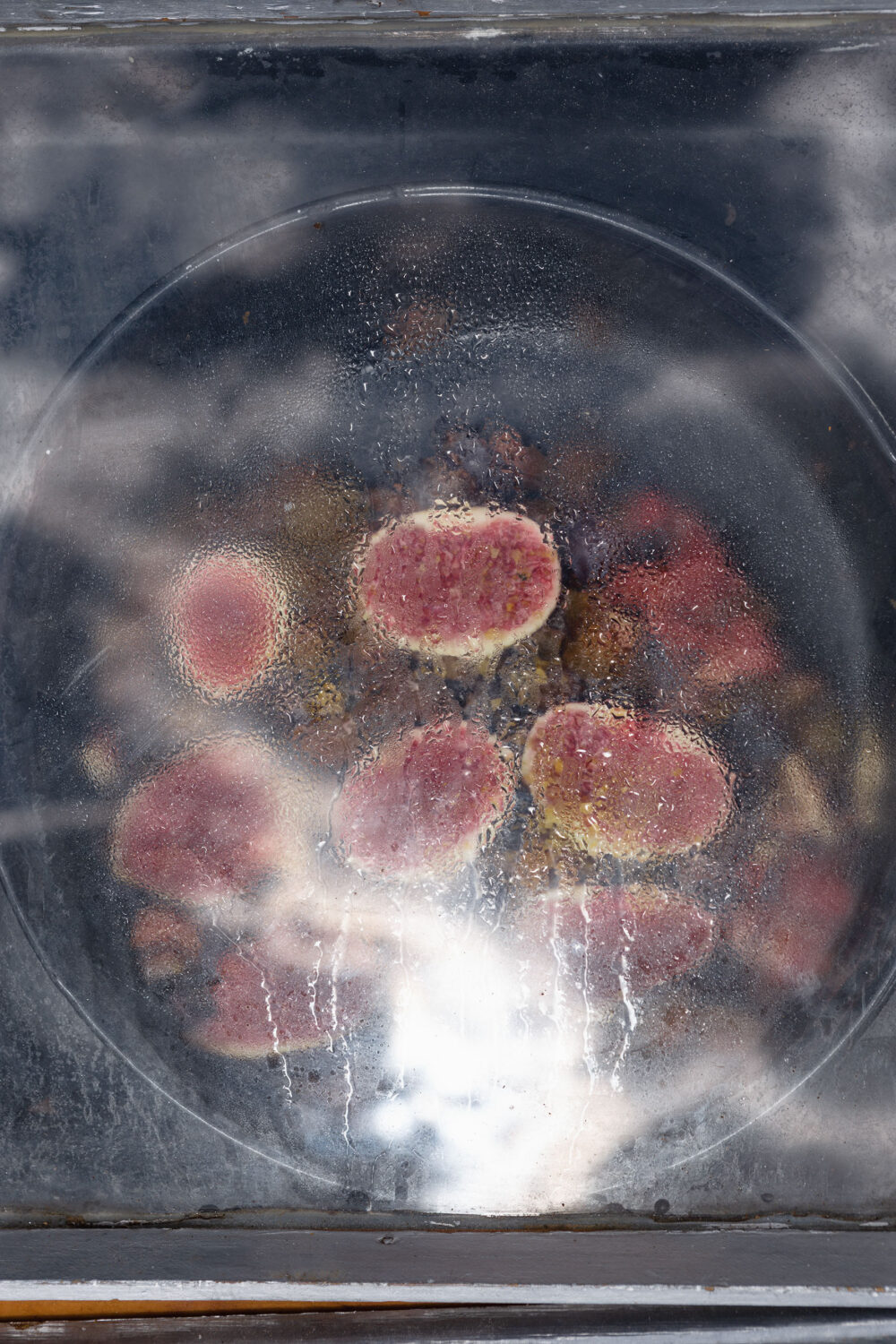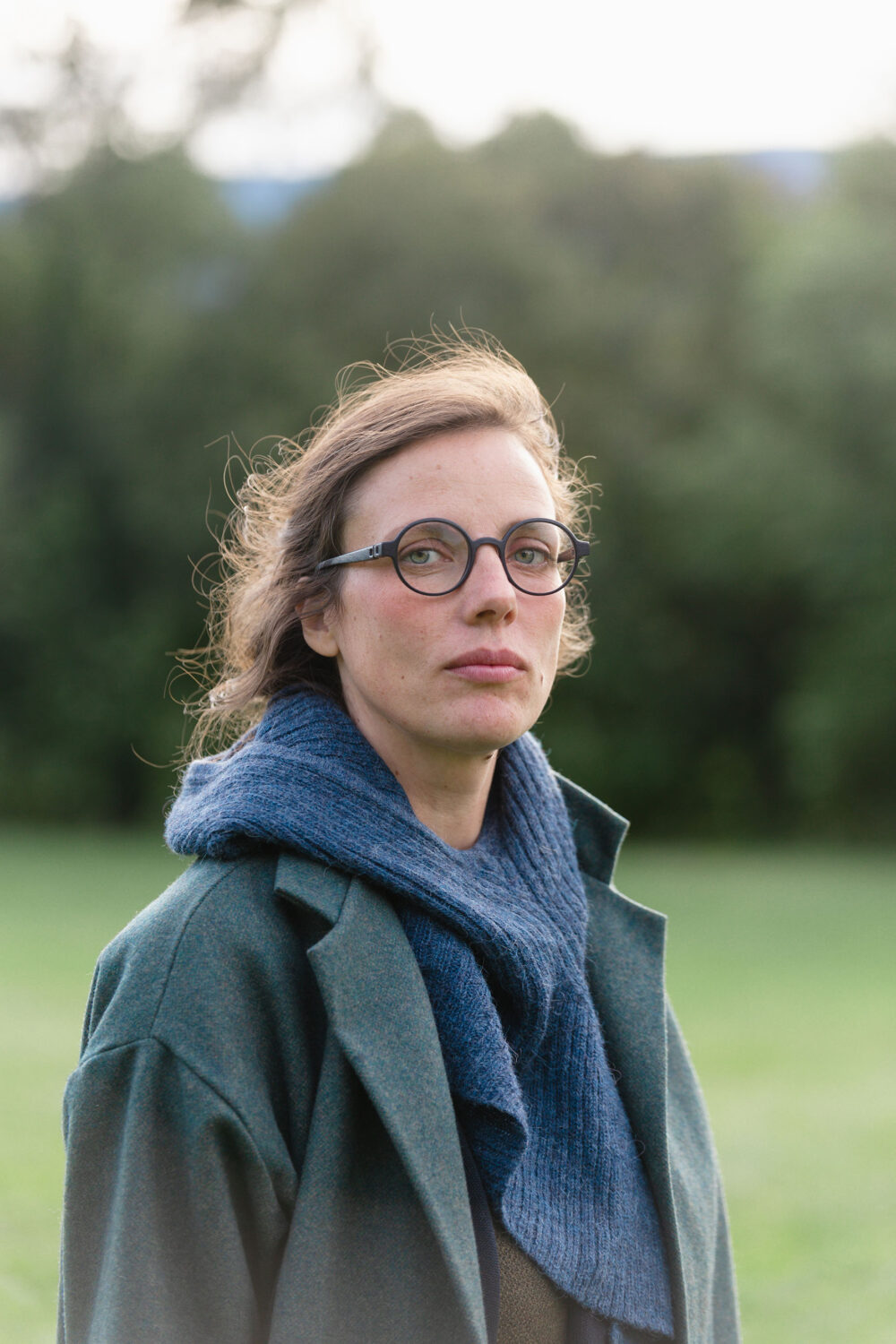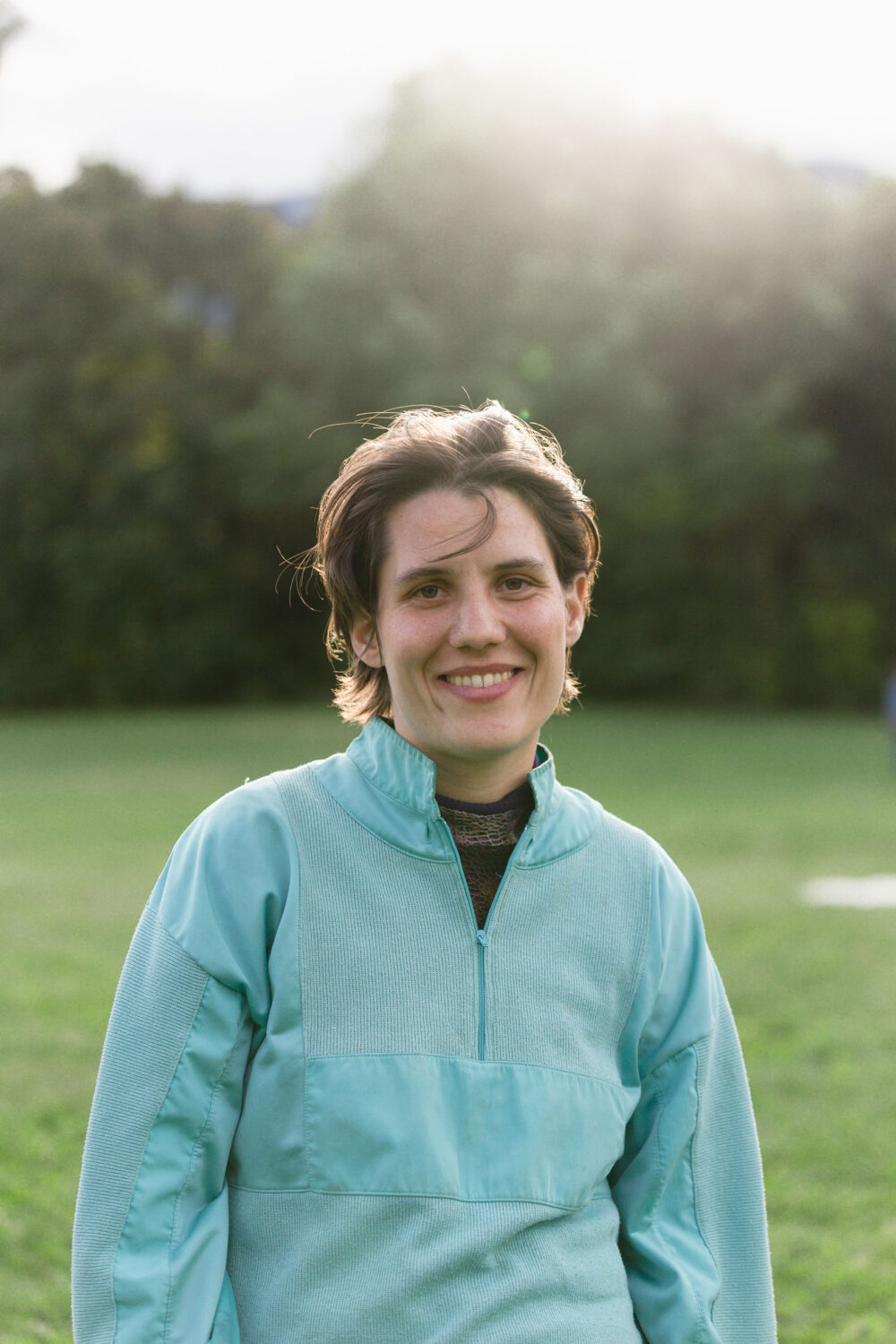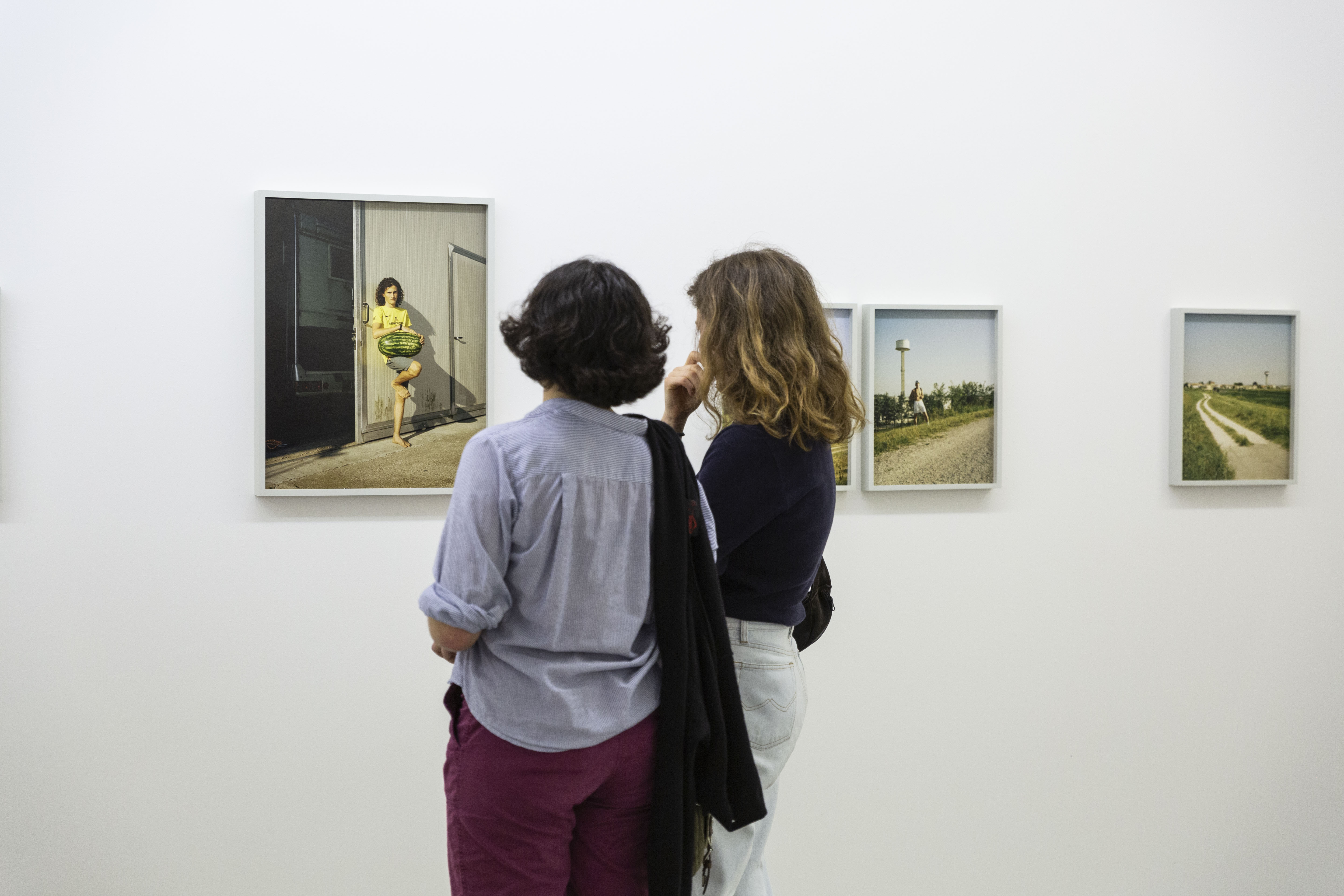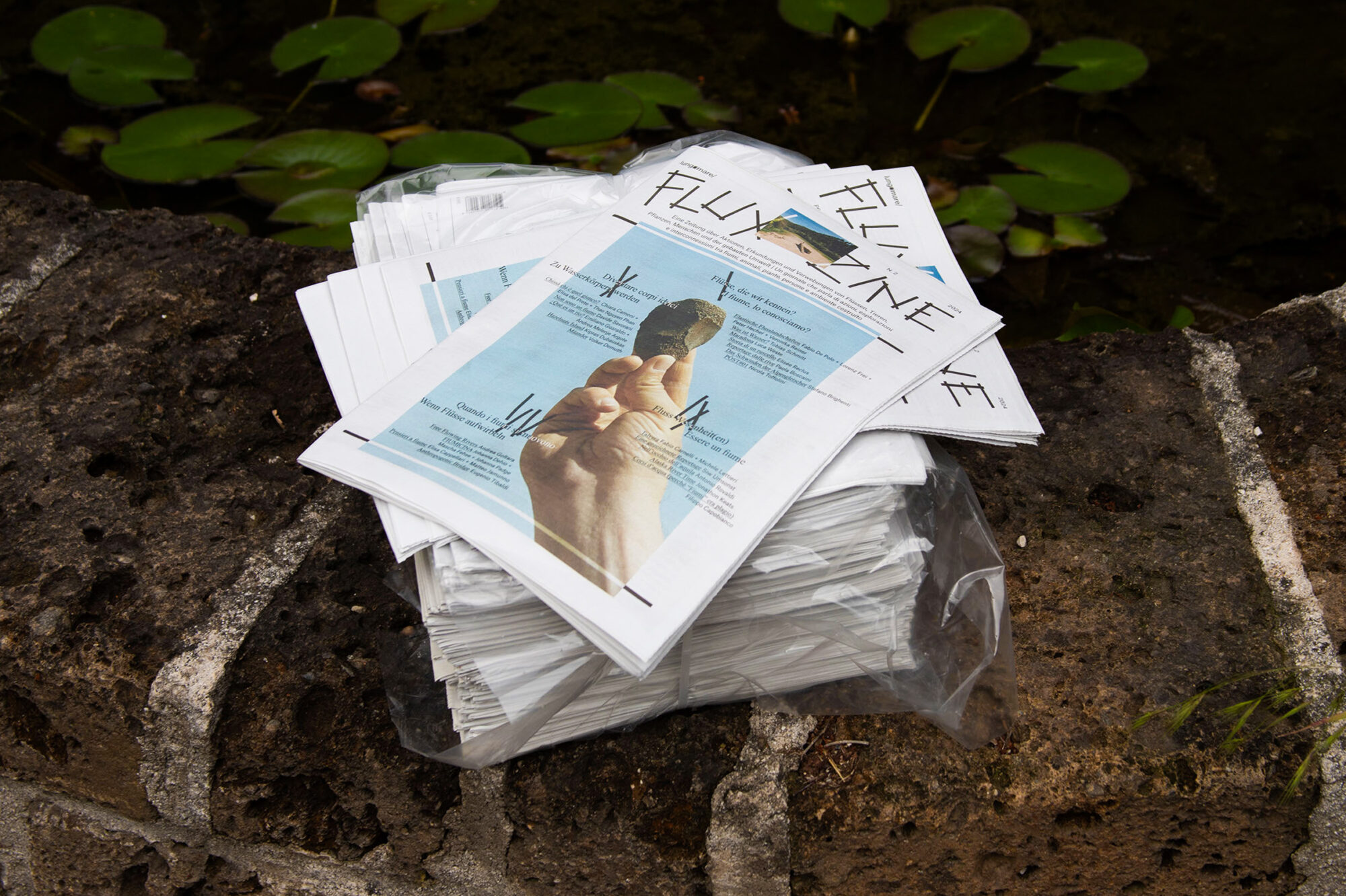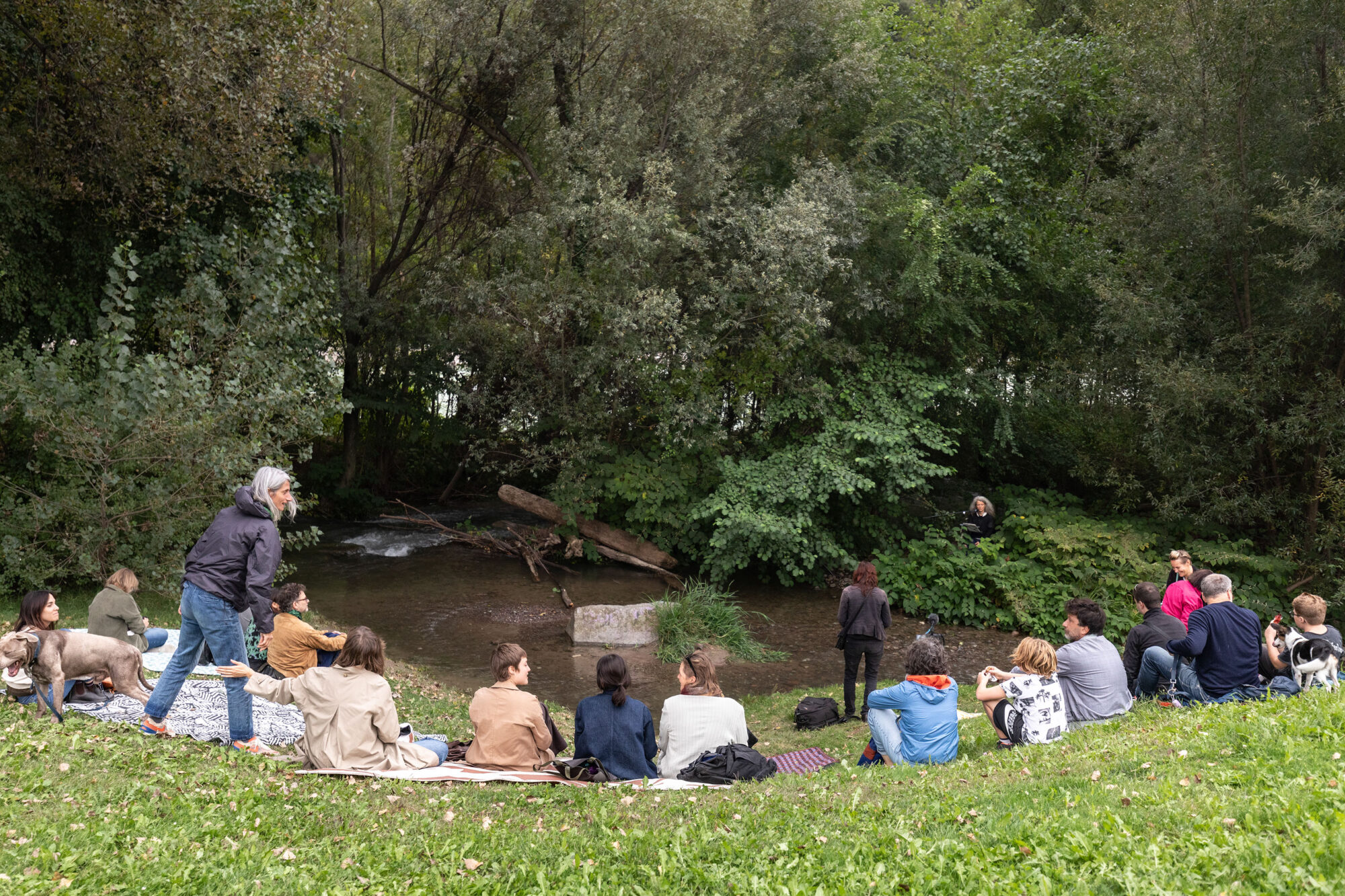FLUX – Fiumicina – An open Kitchen on the River
Fiumicina is the project by Johanna Dehio, Mascha Fehse, Johanna Padge for FLUX – River interventions and explorations: a multi-year programme conceived by Lungomare in which observation of and interaction with Bolzano’s river landscapes take place from various perspectives.
Fiumicina is an open kitchen on the river in which to trigger a transformation of the food chain, no longer as a route for private consumption but as a community tool. The many hands involved in the preparation of a meal are brought to the fore: from harvesting in the fields, to processing and preparation. The public space in which it is set up offers the ideal context for initiating collaborative processes as a means of shaping the environment in which we live. Through the practical and immediate context of cooking and food preparation, Fiumicina is designed to make, the transformative power of elements such as the sun and water perceptible, with a view to rethinking a more sustainable use of resources for climate-conscious nutrition.
In collaboration with the Institute for Regional Development of EURAC Research, Fiumicina is improved through a participatory process, active since 2024, to envision and design a future management model.
July 2022 – An open Kitchen on the River
As a first phase, Fiumicina initiates a three-day improvised kitchen as well as three workshops on the topics: Improvisation and Construction, Spontaneous Herbs along the Riverside, and Experimental Cooking and Baking, together with residents and experts along the riverbank of the Isarco.
From July 27 to 29, 2022, we share recipes with wild herbs, roots, and bread, and experiment with methods of preparing food using fire and clay.
Besides being a place of preparation, the kitchen also serves as a gathering spot, and cooking becomes an occasion for exchange. Fiumicina invites participants to explore the urban natural space and discuss common potentials, needs, and wishes for a new public place at the river while preparing simple dishes.
June 2024 – Experimenting with the Sun – Public Program
In 2024, Fiumicina returns to Bolzano to co-create an open solar kitchen that is temporarily installed on the banks of the river during the public program in June.
During the public activities, Fiumicina offers a co-creative pathway to explore traditional cooking techniques using solar energy, questioning the origins and sourcing of resources, and bringing different food knowledge into dialogue. This approach aims to foster an increasingly aware and sustainable reflection on the use and preparation of food.
Tuesday 18 June
Collective Building (I)
Introduction to solar technology and cooking with sun, installing the solar cooker on the Talfera River; setting up, seating, and table arrangements. The Fiumicina open-air kitchen is an extended riverside/urban infrastructure, specific to the selected site along the River Talvera, therefore resilient, adaptable and integrable. An experimental solar cooking station will be built together, where food brought in or collected along the bank can be heated and cooked. The sculptural installation offers participants an initial contact with solar energy.
Wednesday 19 June
Collective Building (II) of a Solar Kitchen
Collective construction workshop of the solar kitchen, exploration of the sundial, and details on mechanisms and handling through the playful exploration of a sustainable and healthy way of cooking, an understanding and interpretation of the weather and the movement of the sun is promoted, hinting at an adaptation to natural circumstances and, figuratively speaking, a more humble and responsible use of resources. Can we imagine that social and ecological change might concretely begin in the kitchen, rethinking the relationship we have with nature, especially as a food source?
2 pm
The First Coffee
Coffee cooked with solar energy will be available for all participants
[no-sun programme (2–4.30 pm): coffee & cake crafty-discursive workshop at Lungomare, via Rafenstein 12]
Thursday 20 June
The Solar Menu
Cooking day to prepare a full solar menu created with participants, including ingredient preparation, testing various cooking methods (steaming, boiling, baking, deep-frying); documentation of recipes and cooking methods provided as handouts/instructions. What does a climate-conscious diet look like? What methods of preparation do we know that respect resources and where do we still need to experiment and come up with new solutions? Which culinary traditions – local and otherwise – deserve to be revalued and preserved? How can we collectively use the energy that needs to be used? The workshop starts with these questions to experiment with the creation of a solar menu and ends with a collective meal.
5 pm
Come over for a snack!
Public tasting of solar-cooked snacks (in case of rain, this event will take place at Lungomare)
[no-sun programme: Herb expedition/foraging: explore and collect urban resources]
Tuesday 25 June
2–4.30 pm
The Laid Table – Cyanotype Workshop
Crafty-discursive workshop for printing tablecloths with sunlight and teaching solar cooking on the laid table.
The river space in Bolzano is valuable because it is public. It is an intermediate space, of dialogue between urban, human and natural needs. Fiumicina carefully engages this space, to remind us of its qualities and what it already offers us, such as stones and tree stumps, vegetation and animals, while respecting to work while maintaining a permeability to view, water, roots and shoots, in a collaborative process with the surrounding environment. With this in mind, we will deploy experimental techniques of creation in dialogue with it.
[no-sun programme: printing crafty-discursive workshop at Lungomare; alternative printing technique for tablecloths used as a medium to capture conversations and recipes]
Wednesday 26 June
The Solar Menu
Cooking day to prepare a full solar menu created with participants, including ingredient preparation, testing various cooking methods (steaming, boiling, baking, deep-frying); documentation of recipes and cooking methods provided as handouts/instructions.
What does a climate-conscious diet look like? What methods of preparation do we know that respect resources and where do we still need to experiment and find new solutions? Which culinary traditions, local and otherwise, deserve to be revalued and preserved? How can we collectively use the energy that needs to be used? The workshop starts with these questions to experiment with the creation of a solar menu and ends with a collective meal.
5 pm
Come over for a snack!
Public event to know more about Fiumicina on the Talvera with tasting of solar-cooked snacks.
[no-sun programme: Herb expedition / foraging: explore and collect urban resources]
September 2024 – Three Days by the River – Festival
From Friday 13 to Sunday 15 September 2024, between 1 and 8 pm, Lungomare presents Three Days by the River, a Festival by Fiumicina. An Open Kitchen on the River. The project, staged by Johanna Dehio, Mascha Fehse and Johanna Padge at Lungomare’s invitation, is part of FLUX – River Interventions and Explorations.
The Fiumicina Festival Three Days by the River invites people to share the unique cooking experience together in a public space using only solar energy as the heat source. During the peak sunlight hours—between 1 and 4 pm—participants can learn to prepare bespoke recipes according to the solar clock, guided by the project’s creators and a different cooking group each day. Following this, two events feature guests and experts discussing cooking, rivers, solar energy, public space, and common goods, accompanied by tastings and concerts.
Kitchens are places where ingredients and people come together, fostering dialogue and care. In the kitchen, our way of life is manifested concretely and sensually: what we eat, for whom we prepare food, and with whom we share our meals. However, cooking is predominantly practised as a non-representative and non-public activity and, like other caregiving tasks, receives less attention and recognition compared to professional work. Yet, what happens when the act of cooking moves from the private to the public sphere?
Friday 13 September
All of Us, Care, and the Public Sphere
1–4:00 pm
Transformative Buffet
Fiumicina invites the artist Irene Lucas to lead a solar cooking atelier
5:00 pm
Recipe presentation and tasting
5:30 pm
Dialogue between the River and the Double Bass
River Concert by Marco Stagni
6:00 pm
All of Us, Care, and the Public Sphere – public debate
Johanna Dehio (Designer), Francesca Gotti (Architect), Hilary Solly (Anthropologist), Pasquale Bonasora (President of Labsus), Andrea Perini (Cultural Designer, Co-founder of MadreProject, Terzo Paesaggio)
7:00 pm
Dialogue between the River and the Double Bass
River Concert by Marco Stagni
In a time when the climate crisis questions our relationship with nature and the use of its resources, including those depleted for nutritional purposes, the second day of the Festival suggests that the awareness of driving social and ecological change may begin right in the kitchen.
How might we reconsider a common and shared activity like cooking by engaging closely with primary natural resources such as water and sunlight?
Saturday 14 September
Sun, People, and Nature
1–4:00 pm
Edible Forms of Exchange
Fiumicina invites the artist Paula Erstmann to lead a solar cooking atelier
5:00 pm
Sun, People, and Nature – public debate
Johanna Padge (Artist and Designer), Mascha Fehse (Architect and Designer), Irene Lucas (Artist), Johannes Reisigl (Artist and Curator, part of KlimaKultur), Ruth Heidingsfelder (Activist, part of Scientists4Future & Climate Action South Tyrol)
6:00 pm
Presentation of recipes and tastings
7:00 pm
Guitar and Vocals: Self-Composed Pieces
River Concert by Verena Mur
Fiumicina invites CucinaCultura, a project launched in 2015 in Bolzano to explore food and culture through film, music, theater, and performances, with a specific focus on migration, economics, climate change, and conflict. On this occasion, Sunday, September 15, will be devoted entirely to Indian
Sunday 15 September
Neighbours, Neighbourhoods and the River Space
9:00 am– 12:00 pm
Indian Sun-Kissed Snack
Fiumicina invites Charumathi Seshagiri Rao to lead a solar cooking atelier
12-3:00 pm
Presentation of recipes and tastings accompanied by live music
North/South Indian Fusion: Hindustani Melodies Accompanied by Carnatic-Style Percussion
with Prakash Ramachandran and Sarada Barthi
in collaboration with Cucina Cultura
Johanna Dehio is a german designer living and working in Berlin. With a background as product designer, she works in different constellations on applied research and design projects in social and cultural context. Based on a study of different aspects of improvisation which are consistently serving as an impulse and inspiration, her work is concerned with the substance of relationships between people and objects/space. Throughout different collaborative projects, she developed a metaphor of the kitchen as a reference for cultural processes, approaching contextual questions through exemplary practical or sensual experiences. Johanna Dehio is teaching at University of the Arts Berlin, Free University Bolzano and HfbK Hamburg and holding interdisciplinary workshops and lectures.
Johanna Padge studied design and art in Halle and Hamburg. She is a master carpenter and has worked in the crafts and in educational projects in France, Germany, Mali and Mozambique. As a designer she deals with the topics of participatory design, participation and urban planning. Her work takes shape in designed spaces, exhibitions, publications, archives, workshops and conversations. Her interest here is in both social and built architecture, which she understands as processual
Mascha Fehse lives in Berlin and works between Arts, Architecture and Design. Her work deals with questions that concern public space and the commons, focusing on micro-scale collisions, applied experimental approaches and a design discourse that triggers curiosity and leaves room for a variety of perspectives. Her works orbit around social constellations, infrastructural relations, structural connections, environmental dependencies, imaginative associations, and constructive tensions, having resulted in a range of collaboratively produced and socially committed spaces.
Year
2022 – ongoing
